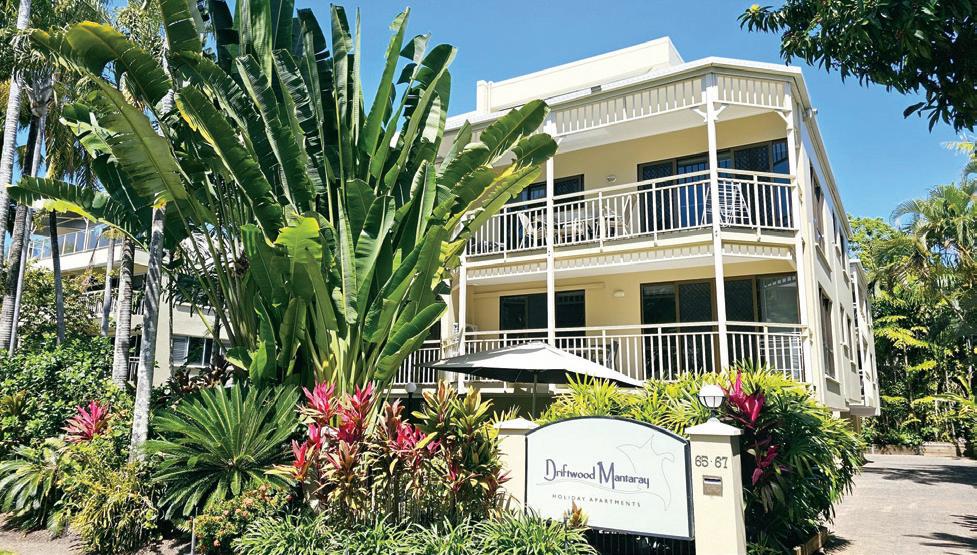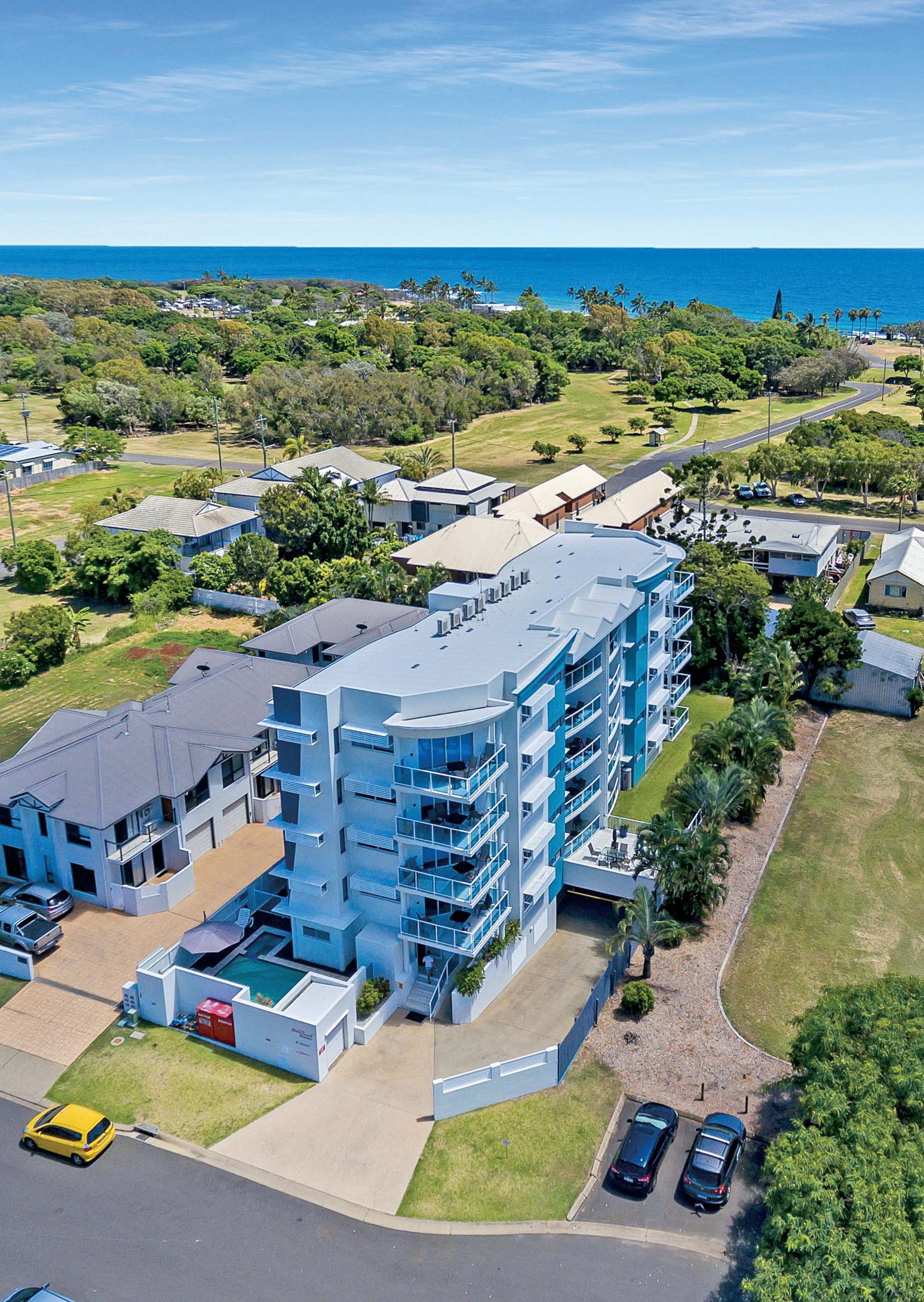


























THE TRUSTED PMS SOLUTION FOR YOUR BUSINESS







March




The views and images expressed in Resort News do not necessarily reflect the views of the publisher. The information contained in Resort News is intended to act as a guide only, the publisher, authors and editors expressly disclaim all liability for the results of action taken or not taken on the basis of information contained herein. We recommend professional advice is sought before making important business decisions.







The publisher reserves the right to refuse to publish or to republish without any explanation for such action. The publisher, it’s employees and agents will endeavour to place and reproduce advertisements as requested but takes no responsibility for omission, delay, error in transmission, production deficiency, alteration of misplacement. The advertiser must notify the publisher of any errors as soon as they appear, otherwise the publisher accepts no responsibility for republishing such advertisements. If advertising copy does not arrive by the copy deadline the publisher reserves the right to repeat existing material.
Any mention of a product, service or supplier in editorial is not indicative of any endorsement by the author, editor or publisher. Although the publisher, editor and authors do all they can to ensure accuracy in all editorial content, readers are advised to fact check for themselves, any opinion or statement made by a reporter, editor, columnist, contributor, interviewee, supplier or any other entity involved before making judgements or decisions based on the materials contained herein.
Resort News, its publisher, editor and sta , is not responsible for and does not accept liability for any damages, defamation or other consequences (including but not limited to revenue and/or profit loss) claimed to have occurred as the result of anything contained within this publication, to the extent permi ed by law.




Advertisers and Advertising Agents warrant to the publisher that any advertising material placed is in no way an infringement of any copyright or other right and does not breach confidence, is not defamatory, libellous or unlawful, does not slander title, does not contain anything obscene or indecent and does not infringe the Consumer Guarantees Act or other laws, regulations or statutes. Moreover, advertisers or advertising agents agree to indemnify the publisher and its’ agents against any claims, demands, proceedings, damages, costs including legal costs or other costs or expenses properly incurred, penalties, judgements, occasioned to the publisher in consequence of any breach of the above warranties.
© 2024 Multimedia Pty Ltd. It is an infringement of copyright to reproduce in any way all or part of this publication without the wri en consent of the publisher.
KEY Commercially funded supplier profile or supplier case study
Supplier information or content
Suppliers share their views in one-o topical pieces
General editorial. Case studies and features may cite or quote suppliers, please be aware that we have a strict ‘no commercial content’ guideline for all magazine editorial, so this is not part of any commercially funded advertorial but may be included as relevant opinion. Happy reading!
Welcome to the March edition of Resort News!
As ‘Himself’ and I continue our adventures in New Zealand, we’re settling into a familiar rhythm. Our days are a whirlwind of remote work, juggling magazine deadlines, AccomProperties responsibilities, and the endless tasks that come with running a small business. We manage to squeeze in moments for gardening and home maintenance, but sometimes it feels like even the smallest hiccup, such as a common cold or a burst water pipe threatens to throw us off course. Not to mention the unexpected shock of an email from Australia Post attempting to justify its impending postage charge increases, ranging from 14 to 24 percent!
Yet, amid our own challenges, we take a moment to salute the onsite managers who navigate


their businesses, buildings, and communities through epic disasters like bushfires, floods, the formidable Tropical Cyclone Jasper, and the ever-changing economic landscape. On top of this, many of you are also tasked with satisfying guests, the likes of preventing infestations of bed bugs, and navigating the world of online reviews!
You are the unsung heroes of our industry, and your resilience is truly inspiring.


In this edition of Resort News, we’re shining a spotlight on sustainability. A greener future is a goal most of us try to work toward but for our industry it goes hand in hand with economic viability. We explore the recent emphasis on NABERS ratings and government initiatives, acknowledging the importance of environmental stewardship while recognising the potential conflicts these mandates may create for bodies corporate. Can we strike a balance amid financial restraints and competing interests?
We also tackle the pressing need for strata insurance reforms in Queensland. Skyrocketing premiums are threatening owners and devaluing buildings more than natural disasters ever could. It’s a situation our experts say demands urgent attention.
On a lighter note, we sit down with Daniel Herbert, a driving force behind the legendary
1999 World Cup-winning Wallabies. Discover how his rugby skills translated into a successful seven-year tenure as CEO of SSKB, a leading strata management firm. Lastly, we catch up with onsite managers Col and Sharon Gall, who thought it was an April fool’s joke when they signed to purchase the MLR at Koola Beach Apartments on the very day that Queensland announced its border closures in April 2020. Their remarkable story is a testament to that resilience of spirit in the face of uncertainty, that so many onsite managers possess that I speak of.
Congratulations to the multitalented and multi-tasking, Kelley Rigby who gave birth to gorgeous Ranger Rigby on Feb 28.
Enjoy this edition.
Warmest regards, Mandy.



















If accommodation managers want to grow their Federal Government procurement business, they will have to take note of new sustainability laws starting on July 1.
However, Management and Lett ing Rights (MLR) experts say the success of the new legislation will come down to economic rather than environmental concerns.
Reduced levies, rather than reduced emissions, will be key, they say. Although many accommodation owners and managers might not realise the new legislation is coming, potentially they could lose a fair chunk of business to another property that takes it seriously.
NABERS (National Australian Built Environment Rating System) is a sustainability measurement system that is used across the property sector for hotels, offices, shopping centres, apartments, and other buildings. It has been broadly adopted by the Australian office sector for years, with mandatory disclosure of a rating when a property is sold or leased. While hotels in Australia have been slow to adopt NABERS ratings, owning companies such as Pro-invest, Salter Brothers, and Dr. Jerry Schwartz’s SFC Hotels have been enthusiastic adoptees, leading the industry.
The NABERS system allows comparisons of hotels across their specific category, considering diff erences in star ratings, size, climate zone, and level of services off ered to guests. It is a national government program administered by the NSW Government, but its operation is overseen by a national steering committee that includes non-voting

stakeholder members from bodies including the Property Council of Australia and the Strata Community Association.
From July 1, Federal Government employees will be required to consider the environment when booking travel. The principal measurements for assessing a hotel’s commitment to ESG (environmental, social, and governance) practices will be via their NABERS rating.
A recent amendment to the Commonwealth Procurement Rules has incorporated potential climate change impact in the assessment of overall ‘value for money’. This will add a sustainability element in the tender assessment that may diff erentiate one hotel from another when competing for government business such as accommodation contracts and conferences.
Those hotels that don’t move substantially towards implementing stricter and more transparent energy performance will lose business.
Ross Beardsell, the Executive Vice President, Strategic Advisory with JLL Hotels &
Hospitality Group, and Duane Loader, Director of JLL Project Management, say clearly those hotels that have been proactive in gaining a NABERS rating are in the box seat to grow their government employee business. In a report for AccomNews, they said: “Many companies – especially ASX-listed corporations – have committed to massive enhancements in their ESG compliance, and they are projecting that onto their suppliers, with hotels being an easy target. Hotels that have traditionally targeted government conferences and events have become used to onerous requirements in documenting their ESG principles, but where rates, special incentives, and other sweeteners may have previously allowed some flexibility, auditing of government compliance under the new rules will ensure a far more rigorous process. Many global hotel groups already have well-established sustainability programs, but the Federal Government has decided that NABERS will be their benchmark. Hotel owners and operators would be well-advised
to have a pathway to NABERS performance improvement.”
Chris Irons, the director of Strata Solve, Queensland’s leading strata dispute resolution problem-solving firm, and the former Body Corporate Commissioner of Queensland, says while the NABERS system promises obvious environmental benefi ts, money in the pockets of unit holders will be the measure of its implementation and success in the strata space.










“For strata, green can be good – if it’s handled right,” Mr Irons said.
“And that’s the issue with NABERS. It’s a commercial issue. If you have one building with a NABERS rating and one isn’t, that’s certainly going to be a benefit in terms of sales and rentals. But you can go through the NABERS requirements line by line and at the end of the day, it’s a decision to be made by the committee – whether it’s the best benefit for the most people in the scheme.
“Let’s say, for instance, it’s going to cost $200,000 to get a building to the place where it earns the NABERS 6 Stars – that still goes to a strata committee and the owners still have to vote on it. If you have a building where there are a lot of owner/occupiers, they might say ‘we’re fine we don’t need to spend this money’. Or if you have a building where there are a lot of absentee investors, they might think it might be worth the money and so it will always come down to a vote.”
Mr Irons said he could foresee disputes arising from the implementation of NABERS and that it was already happening “in a small way with the whole debate about e-scooters and electric vehicles in strata”.
“On the one hand, you’ve got people trying to achieve certain outcomes for their building, trying to make them more renewable and energy-friendly, you’ve got the government pushing them in that regard, but if it’s going to cost people money, they’re not going to do it.”
Mr Irons said among the Queensland government housing standards for rental properties to kick in later this year were laws relating to renewable energy.
“If you are a landlord, you have to abide by that standard – and that could mean a fight with the body corporate over obligations as a landlord, which might not be the same standards as the owner-occupiers.”
He said in any disputes at a building over environmental concerns the best thing for resolution was to forget about the “noble aspirations” of such guides as NABERS and treat contentious issues in a business-like way.
“Once you have discussions on a commercial basis,” Mr Irons said, “it becomes far easier than talking about aspirations or noble outcomes. Usually when things go wrong in strata it’s because emotion gets in the way.”
Trevor Rawnsley, the CEO of ARAMA (the Australian Resident Accommodation Managers Association), said while the NABERS program “has been around for about a decade” to be effective in the MLR realm it had to save a scheme money by showing a tangible reduction in levies.
“NABERS is meant to be a self-regulating method to create some environmental benefits for the scheme,” he said. “That might be good at the construction phase to get a 6–Star rating, but these things come at a cost, and developers are usually reluctant to make things more expensive for the potential market. Trying to retrofit an existing building, especially when the prize is that you spend more money and then pay more in levies, is not a good prize for lot owners.
“We’re seeing governments increasingly regulate to incentivise for less lead car emissions and more environmentally friendly motor vehicles. There will come a time when the government regulates for the NABERS measurements to be adhered to, but until then it’s up to a developer to run the cost analysis to see if it works in the building. If it doesn’t, they might not do it.
“NABERS is being adopted in commercial buildings but not so much in residential because the cost is too high to adopt the full suite of recommendations. For NABERS to really work, it must win the hearts and minds of average residents.”
Mr Rawnsley said NABERS was being adopted and promoted in commercial buildings as an incentive for tenants to take out long-term leases because they might save money on utility bills.
“But I’m yet to see that bleed across to residential buildings where a lot owner would be motivated to buy a unit in a building with a 5-Star NABERS rating, especially if it costs them more.”
He said even though government employees were
being encouraged to book accommodation at properties with high NABERS ratings, MLR properties were not likely to implement changes unless there was “a real economic benefit” for them.

David Nicolas, the founder of the Reson8 marketing agency, suggests there are some fresh trends that could make the ESG journey “more engaging and impactful” for short stay accommodation properties.
One such trend, he says, is hyper-local sourcing. “Hotels are increasingly sourcing locally not just for food but also for furnishings and décor. This reduces the carbon footprint and supports local businesses, creating a win-win situation for everyone involved,” he wrote in an AccomNews report.
“Another emerging trend is the use of virtual experiences to educate guests about a hotel’s sustainability efforts. Imagine offering a virtual tour of your recycling facility or a behindthe-scenes look at your energyefficient kitchen. This not only educates your guests but also makes them feel involved in your sustainability journey.”
According to the SCA, the fact that one in five Australians living in strata schemes will have a significant multiplier impact on the Commonwealth Government’s acceleration towards net zero. According to estimates from NABERS, the built environment accounts for approximately 25 percent of carbon emissions across Australia, and 40 percent of global carbon emissions.
In a submission to the Federal Government in 2022, the SCA said: “Investing in the capability for strata to build upon its strengths as both a comfortable and more sustainable way of living is an opportunity for the commitment of the government towards a netzero emissions target by the year 2050 to be realised more readily, and at a scale unseen elsewhere throughout the Australian economy.
“Similar to other industries, the strata sector is uniquely responding to consumer demand for greater sustainability and higher performance, including the installation of EV charging, energy-efficient lighting and appliances, and even solar energy production in strata developments such as apartment buildings and townhouse complexes.
“Furthermore, the economic benefits of investing in sustainability within the strata environment are more readily apparent than in individual households, with the multiplier effect of decisions made by owners’ corporations and bodies corporate around sustainability affecting the habits of more households and consumers. For example, when improving their NABERS energy rating from 3 to 5 Stars, apartment buildings can save an average of $104,402 per annum.”
For the accommodation industry, one thing remains clear: the pathway to a more sustainable future intertwines with economic viability. The recent focus on NABERS ratings and government initiatives highlights the importance of environmental commitments, but for stakeholders success lies in finding a balance.
The journey towards sustainability isn’t without challenges; retrofitting existing buildings and aligning strata interests with sustainability goals require careful consideration and investment. However, there’s also room for innovation and creativity.
Finally, keep in mind that sustainable practices can lead to cost savings, enhanced brand reputation, and increased competitiveness.
 By Grantlee Kieza, Industry Reporter
By Grantlee Kieza, Industry Reporter
Urgent reforms are needed to strata insurance laws in Queensland where astronomical premiums are hurting owners and damaging building values much more than natural disasters.
That’s the opinion of property experts such as former Queensland Body Corporate Commissioner Chris Irons and ARAMA CEO Trevor Rawnsley.
Mr Irons said strata insurance was likely to be a major state government election issue in October.
“North Queensland will be where the state election is won and lost,” Mr Irons said, “and
if someone up there takes a really strong stance on a way to fix insurance that could be the difference between winning and losing at this point.”
His comments follow an adjudicator’s order from the Office of the Commissioner for Body Corporate and Community Management on February 2, to allow the body corporate for the iconic McWhirters Apartments in Brisbane’s Fortitude Valley to make emergency expenditure for their compulsory building insurance.
The insurance cost $1.2 million, with a $1 million premium issued by Lloyd’s of London through brokerage firm AB Phillips, as well as associated fees, taxes and charges.
McWhirters Apartments is a 114-lot scheme located at 270 Brunswick St, Fortitude Valley.
The building originally housed the McWhirters department store, constructed in four stages between 1899 and 1929 and is heritage listed.
It was insured with CHU but in December 2023, CHU advised that they would not offer a renewal.
The body corporate manager’s insurance broker, MAI, sought quotes from other Australian insurers but due to the building’s claims history and known defects identified in a building inspection report, the Australian insurance market was unwilling to accept the risk.
Mr Irons said the McWhirter’s premium had tripled, and that Lloyd’s of London, was “shorthand for the last resort in insurance”.
“It’s typical of what is happening in a lot of bodies
corporate these days,” said Mr Irons, who now runs Strata Solve, Queensland’s leading strata dispute resolution and problem-solving firm.
“In this particular case it’s especially noteworthy because we’re not talking about a building, say at Magnetic Island that is exposed to cyclones, or one at Graceville or Yeerongpilly that is exposed to floods.
“This is a century-old brick building smack-bang in the middle of an urban environment whose premiums went up three-fold and they had to seek insurance in a great rush.
“The order showed that the body corporate knew there were defects in the building, hadn’t corrected them, and then couldn’t get insurance, and that is a scenario that gets repeated over and over and over.
“It’s going to cost bodies corporate so much money to address their responsibilities and they have no option to not address them by law. But then you’ve got owners who won’t pay, or more accurately can’t pay for repairs, so they vote ‘no’ to spending on maintenance and then when it comes time for insurance renewal the insurer says, ‘you’re too much of a risk, go to Lloyd’s of London.’”
Under Queensland strata law, insurance for common areas is compulsory, regardless of the expense.
Mr Irons said an obvious solution for strata woes was to have state governmentcontrolled and initiated insurance for strata schemes.
“If the government is going to say ‘we 100 percent require you to be insured – there are no options about that’ – then fine, it’s time for them to cough up and support that insurance.
“Alternatively, the government could give bodies corporate the option of not being insured and allow them to come up with their own system – for instance, they might put aside extra money in say a contingency/slush fund and that is their protection.
“In the McWhirters case if they only set aside a fi ft h of that $1 million premium that is still $200,000, and that would cover a few repairs which might then allow them to go back to other insurers with confidence that they could get cover.”
Mr Irons said it was common to hear of 20 to 30 percent increases year-on-year when it came to strata insurance premiums.
“North Queensland presents some of the worst examples
of this but Gladstone and Bundaberg are reporting it too. I’ve heard of buildings in Brisbane struggling to be insured and it’s got nothing to do with weather, it’s all about maintenance.
“In some cases, I’ve even heard that a building can’t get insurance because it’s got short-term lett ing on site.
“In one extreme case, I heard of a building that couldn’t get cover because it was student accommodation and it was feared the students might be plugging in a whole range of appliances – computers, kitchen appliances, phones –and they might start a fire.”
Mr Rawnsley said anywhere north of Bundaberg only had one insurer off ering completive prices for cover on strata buildings.
“It’s an uncontested market. There are other insurers in that space, but they are totally uncompetitive,” he said.
“With the situation at McWhirters, it seems North Queensland is creeping into Brisbane. What’s been happening at McWhirters has been happening in North Queensland for years.
“We followed a townhouse
complex on the beach in Mackay that went from $8000 for insurance annually to $96,000 in just three years. The levies become so high that people end up selling, and it adversely aff ects the price of real estate because the insurance rates are so high.”
Mr Rawnsley said ARAMA had long called for sweeping insurance reforms.
“At the moment there is stamp duty on insurance and GST on insurance, eff ectively tax on tax,” Mr Rawnsley said. “So, we’ve called on the Federal Government to remove stamp duty when it’s compulsory to have insurance. That accounts
for 10 to 12 percent of the premium in tax. We’ve called on the state government to remove GST on that insurance which accounts for another 10 percent.
“We’ve also suggested that in areas where the insurance sales are uncontested, then any agents for insurance brokerage firms, such as body corporate managers should not charge a percentage of the premium as a fee.
“Some have been charging a 25 percent fee, so it’s in their interests to keep the price of premiums rising.
“For some body corporate managers insurance premiums make up a third of their income.
“Instead, we say they should be paid by a fi xed fee or an hourly rate commensurate with their eff ort because that is much fairer.
“If those measures – the elimination of stamp duty and GST, and the elimination of percentage-based fees for brokers – were introduced there would be a huge reduction in strata insurance premiums.”



 By Trevor Rawnsley, CEO, ARAMA
By Trevor Rawnsley, CEO, ARAMA
A resident manager will always be the best person for the job.
Resident managers deliver service around the clock in a way that is cheaper and far more effective than any form of management offsite.
That’s just common-sense.
But sometimes it’s important to remind resident managers themselves of just what a great service they provide and for those resident managers, in turn, to remind the body corporate of all the benefits that come from a manager who is onsite and ready to deal immediately with problems or emergencies.
In the past few years there have been hundreds of time and motion studies completed that showed in 87 percent of cases, the onsite manager was
being underpaid, sometimes by as much as 40 percent.
And we know that lot owners appreciate onsite management with a long-term agreement because on 85 percent of occasions when asked to extend or vary the caretaking service agreement they say YES! That is real people power.
Going that extra mile for owners and guests is the secret to a long and fruitful journey in Management and Letting Rights (MLR).
We all work in a service industry and great service is what resident managers provide. They are the cornerstone of the $55 billion yearly economic benefit for Australia that comes from the MLR business.
Not having a resident manager at a scheme means outside contractors are called in as required, and that’s usually pretty often. Each call-out attracts a fee and takes time.
Without a resident manager, a scheme would require an offsite manager/body corporate representative and/or well meaning volunteer to arrange and supervise contractors, obtain quotes, check completed work, authorise accounts for payment, and provide reports for the body corporate committee.
Without a resident manager, there would have to be a pool maintenance contractor
for the daily cleaning, testing, recording, and adjusting of chemicals across seven days a week.
Without a resident manager, a gardening contractor would have to be retained for the regular maintenance of gardens, lawns, shrubs and hedges, as well as watering, fertilising, mulching and the removal of rubbish.
Without a resident manager, there would have to be a cleaning contractor to clean all common property areas daily both internally and externally.
Without a resident manager, a maintenance contractor would have to be employed to carry out minor repairs and perform maintenance of the common property to such a level as to not require the services of a skilled tradesman.
Without a resident manager, a security company would have to oversee the general security of the property, maintain order, and be on call for emergencies, break and enters, or disturbances.
With onsite management, the manager generally resides onsite 24 hours a day or because the business is focussed entirely on that scheme the response time can be measured in minutes not hours or days. Offsite service contractors (and there could be plenty to deal with) do not live on site, do not focus on that scheme
and are nowhere near as responsive for emergencies.
The onsite manager has a financial interest in the property as a resident lot owner who runs a business that is dependent on the success of the property and the satisfaction of residents. The offsite manager has no financial interest, no skin in the game, and is paid for contracted services rendered.
The maintenance and care of a property is a daily routine for the resident manager; the offsite manager sees it as work for contractors when required.
The onsite manager typically ensures the swimming pools stay clean, tests the water and records the levels daily – several times daily during high usage in the summer. The offsite manager usually does it only once a day in summer, if that, and less often at other times.
Common area cleaning is a daily task for the resident manager, but while an outside contractor might do some cleaning daily, more often than not it is weekly.
The offsite gardener will not stop to check the pool, pick up rubbish and tidy the pool furniture before trimming the shrubs, yet the resident manager will do all these things and more because they care.
It’s a similar situation with cleaning the barbecue and associated amenities. The onsite service contractor
usually looks after the garden every day and picks up rubbish while conducting normal activities. Offsite service contractors will sometimes employ other contractors and the rubbish can stay where it is until the contractors arrive.
The resident manager maintains and secures master keys. This enhances the security for those who live onsite. Their usage is recorded onsite and the keys do not leave the property. With an offsite contractor, the keys are taken offsite, and there is no security of possession.
The onsite manager is aware at all times of the condition of the complex, and is there to provide preventative measures, deal with contractors, inspect and supervise the progress of work, check the completed work, and authorise payment.
The offsite service contractor only carries out relevant inspections when they are paid to do so and work with other contractors by appointment, so as to fit in with other activities.
Offsite contractors will only react to problems with pumps when visiting the complex or when notified of a malfunction. Similarly, they will only know about problems with firefighting equipment when notified of a problem or by an outside contractor. Under offsite management, time switches are usually only adjusted seasonally by a contractor.
By contrast, the resident manager will regularly monitor the operation of all pumps and fire alarms and will have equipment tested and inspected routinely. Time switches will also be monitored and adjusted regularly for security and power savings.
In matters of safety, a resident manager is vital.
Take things like drainage and stormwater run-off. Having someone onsite ensures that drains are monitored during heavy rain and cleared promptly. At a property where there is no resident manager, the drains are maintained by an outside contractor. No one is onsite during heavy rain periods to monitor or prevent water damage if a problem occurs.
In a similar way, the resident manager can usually make minor repairs at a building as required. No labour cost is involved as it’s part of the
manager’s remuneration.
The resident manager checks common areas and security lighting nightly. Bulbs are replaced in a timely manner for safety and security reasons.
The offsite contractor sends someone out to fix the lights only when problems are reported and at the very least that would be the next day. Call-out fees represent a significant financial cost.
The onsite manager can take care of lift or electric gate breakdowns by immediately actioning a response. That is much quicker and more effective than having to report the problem to a contractor who is not onsite and may take any amount of time to respond.
When it comes to an incident and accident register, the resident manager maintains and updates them as incidents occur for the protection of the body corporate against future claims. They undertake regular inspections and perform regular maintenance to protect the body corporate against workplace health and safety claims. Offsite contractors do not.
The resident manager clears, sorts, and redirects mail daily if required. This is a task that is often left to a nosey volunteer. The resident manager also provides regular reports on the operation and maintenance of a complex for committee meetings. Offsite contractors usually only do this when requested.
The onsite manager compiles and holds onsite the tenant register, and monitors carparking and security day and night. The offsite contractor does not.
The onsite manager can curtail disturbances or tenancy breaches immediately, even if it’s just a quiet word to tenants or visitors unaware of the rules.
With offsite contractors there’s no one in attendance to handle problems and the manager is not usually available after hours. A security firm has to be called in. That’s not cheap.
Community title schemes are better maintained and have better safer occupants because resident managers scrutinise prospective tenants more carefully.
The property is simply managed better by a resident manager with a long-term agreement. Long term agreements are a vital component of safe and secure schemes. Afterall, unit owners come and go, tenants come and go, and someone has to take a long term view regarding the wellbeing of the scheme and its occupants and investors.
It has been proven time and time again that resident managers save a scheme money and provide much better service than any outside source.
Resident managers are on a fixed contract with their body corporates and on average are receiving about $45 an hour for their caretaking duties.
At a time when unskilled trades are now charging close to $100 an hour or more – and that’s if you’re lucky enough to find one to do the work – the benefits of onsite management have never been more obvious.
Resident managers can also provide owners and committees with great savings through their work as building managers because
they can batch jobs together, and they can save owners a small fortune by overseeing preventive maintenance that can significantly reduce repair work and insurance premiums.
Many resident managers even save schemes money by retaining service providers with whom they have a good working relationship, especially plumbers and electricians, because if those skilled trades have worked at the same complex for a long time they literally know a building inside out. They can get work done quickly and with less expense.
Contractors who are offsite simply do not know a building as well as someone who lives and works there 24/7. Offsite contractors are more expensive and less effective than resident managers.
Those managers who live onsite own a unit in the building and run a business that depends on making sure all their neighbours are happy and that their building is the very best it can be.
The resident manager will always be the best person for the job.














 By Ben Ashworth, Senior Associate, Small Myers Hughes Lawyers
By Ben Ashworth, Senior Associate, Small Myers Hughes Lawyers
When describing a caretaking or letting agreement, it is quite common for people to describe them by referring to the total time remaining before the agreement expires.
Typically, this description also includes any option terms available in the agreement, for example, something described as a “ten year” agreement might actually be an agreement with a fi ve year term plus an option for a further fi ve years.
If your agreements have option terms in them, it is important that you don’t fall into the trap of assuming that there is nothing you need to do to activate and use the options. Not all options work the same and the way your options worked in one building isn’t necessarily the same in the next. In management rights, the vast majority of option terms will fall into one of three types: an automatic option; an exercise prior to a key date option; or an exercise between key dates option.
The best-case scenario for managers is a set and forget automatic option, that is, an option that automatically exercises unless the manager
Failing to be on top of your duties when it comes time to exercise an option is particularly risky
chooses not to exercise the option. Automatic options used to be more common in older caretaking and lett ing agreements, but are becoming increasingly rare. If you have an automatic option in your agreement, it is generally good business practice to provide the committee with a letter before the option term commences reminding the committee that your option term exercises automatically, but it is not essential.
Be aware that not all options in an agreement need to be exactly the same and an agreement that may have had automatic options at first might have diff erent types of options later on. This is especially common in Queensland, where each time an agreement is topped up the type of option used can be unique. The second, third, or fourth options may all be completely diff erent in how they work and how they are exercised.
Many caretaking and lett ing agreements have options that can be exercised if a notice is given to the Body Corporate prior to a certain date, that is, any date prior to the expiry of the current term, or any date at least three months prior to the expiry of the current term. If your agreement has
this kind of option, it means you could exercise your option immediately, even if it is years before the current term ends. In some particular circumstances you might not want to exercise an option immediately, but for many managers it is far better to exercise this kind of option sooner rather than later and have one less risk hanging over your business.
It is increasingly common for options to only be exercisable during a set period, for example, between six and three months prior to the current term expiring. This means that the manager must wait to exercise the option until closer to the end of the term, and then has a limited window of time in which to send notice to the body corporate. It is very important for managers with this kind of option to track these dates and be ready to issue the necessary notices during the set period.
Sending a notice just one day too early or one day too late can mean that the option term has not been exercised correctly and will have no eff ect. Failing to exercise an option correctly ends your agreement, even if you still have other options yet to be exercised.
In addition to paying attention to how you must exercise your options, it is also relevant in many agreements that you must not be in breach of the agreement when the option is exercised. For example, if you are in breach of the agreement when you send a notice to exercise your option, or in breach at the time the new option term is due to commence, it might prevent your option term from having any eff ect and bring your agreement to an end. There is never a good time to drop the ball when running your business, but failing to be on top of your duties when it comes time to exercise an option is particularly risky and managers should make extra eff ort to avoid this. What is considered a “normal” option has been evolving over the years. Automatic options were common twenty years ago but rare to find these days. In my recent experience, if you are asking a body corporate to approve a new agreement or add a new option term, the body corporate will likely want an option term that is only exercisable between a limited date range and is subject to the manager not being in breach of the agreement in any way.
No matter what kind of option term you have it is important that you are familiar with how it works and what you need to do to exercise it. It is never safe to assume that all your options are exactly the same, and even caretaking and lett ing agreements that operate together might be diff erent from each other. If you are ever unsure of how and when to exercise an option, you should seek legal advice.
Liability limited by a scheme approved under Professional Standards Legislation.
Disclaimer – This article is provided for information purposes only and should not be regarded as legal advice.















Introducing Resly - the MVP of hotel management! Trust account compliant, with a powerful property management system, seamless channel manager, and commission-free direct booking engine, Resly is the ultimate all-in-one solution for hoteliers.
And the best part? Resly is 100% cloud-based, so you can access it from anywhere, at any time, on any device
resly.com.au
Community living requires a body corporate to make formal decisions to ensure the smooth day-to-day running of the complex.
However, it is not always clear whether a body corporate decision should be made by the committee or by owners at a general meeting.
There is a common misconception that if a bylaw or a provision of the legislation refers to a body corporate decision, a general meeting vote of the owners is automatically required.
However, many of these decisions can simply be made by the committee – the body corporate’s elected representatives.
This article clarifies the committee’s integral role as a body corporate decision-maker.
Some body corporate decisions must be made by the owners at a general meeting – namely, at an annual general meeting (AGM) or an extraordinary general meeting (EGM).
Various general meeting resolution types exist under
the legislation. For each of the resolution types listed below, there is a different method of counting votes to determine if a motion passes or fails:
• ordinary resolution;
• special resolution;
• resolution without dissent;
• majority resolution.
When the legislation specifies a general meeting resolution type, it is clear what is required to decide an issue. However, when no resolution type is specified, or an issue to be considered by the body corporate is not covered under the legislation or the by-laws, the process for decisionmaking can be unclear.
When no resolution type is specified, a decision can normally be made by:
• an ordinary resolution at a general meeting; or
• a committee resolution (if it is not a restricted issue for the committee).
While the committee is empowered to make many decisions on behalf of the body corporate, certain issues fall outside the scope of their decision-making power – these are called ‘restricted issues.’
The Standard Module and the Accommodation Module specify that the committee cannot:
• set or change a body corporate levy
• make decisions which change the rights, privileges or obligations of owners
• make decisions that must be decided by one of the general meeting resolution types (as discussed above)
• start a legal proceeding, unless it is:
1. to recover a liquidated debt against an owner (debts with a clearly defined amount such as levies or interest)
2. related to a proceeding where the body corporate is already a party
3. or an offence under the by-law contravention provisions of the Body Corporate and Community Management Act 1997 (the Act)
4. a proceeding under chapter 6 of the Act (including for the
enforcement of an adjudicator’s order)
• pay remuneration, allowances, or expenses to a committee member unless it is for:
1. reimbursement of expenses of no more than $50 incurred in attending a committee meeting; and
2. the reimbursement would not result in more than $300 being reimbursed to the member in a 12-month period for this purpose.
While mostly the same as the Standard Module and the Accommodation Module, restricted issues for the committee differ slightly under the Commercial Module and the Small Schemes Module
The type of legal proceeding a body corporate wants to initiate will determine how the decision is made.
The committee cannot start legal proceedings unless it falls into one of the exceptions listed above – these exceptions are called ‘prescribed proceedings’ under the Act.
Normally, proceedings (other than prescribed proceedings) must be decided by special resolution at a general meeting.
According to section 312 of the Act and the restricted issues provisions in the modules, an appeal against an adjudicator’s order is the only prescribed proceeding that cannot be decided by the committee.
As such, a general meeting vote by ordinary resolution is required to lodge an appeal.
Most body corporate committee members are volunteers who are not paid for their services.
As highlighted earlier, the committee cannot vote to pay a committee member unless the payment falls within the specified exception about expenses incurred in attending a committee meeting.
Any other remuneration, allowances or expenses paid to a committee member must be approved by ordinary resolution at a general meeting.
There is no equivalent restriction on paying committee members under the Commercial Module.
The committee’s role as a decision-maker is vital to the administrative and day-to-day running of the body corporate.
Given the time and expense often involved in organising a general meeting – especially in larger bodies corporate –it would be impractical for every decision to be made at a general meeting.
According to section 100 of the Act, a committee decision is a body corporate decision unless it is a restricted issue.
Also, in section 94(2) of the Act, a resolution made at a committee meeting is listed as an example of a body corporate decision.
Consequently, if a by-law or a provision in the legislation simply refers to a body corporate decision, or an issue is not covered under the legislation or a scheme’s by-laws, the committee has the authority to make the decision – either at a committee meeting or by a vote outside a committee meeting (VOCM) – provided it is not a restricted issue.
When discussing the committee’s role as a body corporate decision-maker, the adjudicator in Hedges 252 [2022] QBCCMCmr 457 referred to the Queensland Civil and Administrative Tribunal (QCAT) appeal of Carroll and Ors v Body Corporate for Palm Springs Residences CTS 29467 [2013] QCATA 21 in which it was observed that: “as between the committee and the body corporate, the general rule is that the committee is for most purposes the agent, or alter ego of the body corporate.”
Some common examples are outlined below to help illustrate the committee’s power to make decisions for the body corporate.
Example 1: improvements to common property by a lot owner
The legislation provides that the body corporate can authorise an owner’s improvement to
the common property for the benefit of their lot if:
• the total cost is $3000 or less; and
• the improvement does not detract from the appearance of any lot or common property; and
• the body corporate is satisfied that the use and enjoyment of the improvement is not likely to be a breach of the owner’s duties as an occupier (such as causing a nuisance).
However, an owner’s improvement must be authorised by ordinary resolution at a general meeting if any of the points above are not satisfied. The distinction between body corporate approval on the one hand, and approval by ordinary resolution on the other, indicates that committee approval is sufficient for an owner’s improvement that meets the relevant criteria.
The regulations for owner improvements to common property differ under the Commercial Module
Example 2: improvements in an exclusive use area
Unless a body corporate’s exclusive use by-law states differently:
• an owner can only make an improvement to their exclusive use area if it is authorised by the body corporate; or
• if the cost of the improvement is greater than $3000, it must be authorised by an ordinary resolution. Again, a distinction is made between body corporate approval (which can be satisfied by a committee resolution) and approval that must be authorised by an ordinary resolution at a general meeting.
Example 3: animal by-laws
Many bodies corporate have a by-law which requires written approval of the body corporate to keep an animal. If there is only a reference to the body corporate in the by-law (and no reference to a general meeting resolution), a committee decision is usually sufficient.
In the matter of Robina Crest [2016] QBCCMCmr 275, the bylaw required written approval of the body corporate to keep an
animal. The committee refused the applicant’s request to keep a Maltese terrier and suggested that the applicant submit their request to the AGM to be voted on by the owners instead. As several owners did not want animals in the scheme, the committee did not want to make the decision on their behalf.
Rather than submitting a motion to the AGM, the applicant lodged an application disputing the reasonableness of the committee’s decision to refuse the animal. The adjudicator noted that “the fact that the committee invited the applicant to submit a motion to the AGM does not make the committee’s decision to refuse consent any less unreasonable”.
The adjudicator also observed that although an owner can still submit a motion to a general meeting after the committee has made their decision, “this does not negate the committee’s responsibility to make decisions reasonably on behalf of the body corporate”.
If there are certain matters that owners do not want the committee to rule on, they can vote by ordinary resolution at a general meeting to make the matter a ‘reserved issue’.
Any reserved issues must be recorded in a register kept by the body corporate. The register must include:
• a description of the issue;
• the date of the general meeting decision reserving the issue.
A copy of the register of reserved issues must also be circulated to owners with the notice of the AGM.
We hope that this article has clarified some of the confusion surrounding the committee’s important role as a body corporate decision-maker. In view of the potential impact that certain decisions may have on individuals in a body corporate, it is imperative to understand who has the power to make these decisions. Equipping yourself with this knowledge may help to avoid unnecessary disputes in the future.
 Daniel Herbert
By Grantlee Kieza, Industry Reporter
Daniel Herbert
By Grantlee Kieza, Industry Reporter
Daniel Herbert was a driving force in one of the greatest rugby union teams ever assembled: the 1999 World Cupwinning Wallabies.
That all-conquering side was built upon innovation, teamwork, and commitment to excellence, factors the new Chair of Rugby Australia has brought into his seven-year tenure as CEO of strata management firm, SSKB.
The company, operating for three decades, manages close
to 800 strata schemes from North Queensland down to Melbourne, employing 140 staff across fi ve offices.
Reflecting on his career in sport, Daniel recognises the valuable lessons that apply to business.
“The team-first approach, where the team is more important than the individual, is an obvious one,” he said.
“In sport you learn about dedication and commitment. It teaches you that success requires more than just showing up 9 to 5; you always need to put in discretionary eff ort to stand out from the crowd.
“There are many life lessons in sport, particularly in team sports. In a good team, you draw energy from your teammates,
and I feel the same here at SSKB - it’s the people who energise me to go the extra mile.”
Daniel said that his managerial roles with Queensland Rugby from 2008 until 2017 were excellent preparation for transitioning to the world of strata management.
“Queensland Rugby is the governing body overseeing all the community clubs in the state and there are more than 200 of them that have volunteer committees, a treasurer, secretary, board members, and a chair. It’s similar to the body corporate world where you have a group of volunteers sitt ing on a committee,” he explained.
“In sport, you have passionate volunteer committees dedicated
to their club, while in the body corporate sett ing, the passion is directed towards their home.”
Known for his hard-running rugby style and crushing defence, Daniel revolutionised the position of outside centre.
On the subject of innovation in strata, he highlighted SSKB’s client-centric service model, which has driven significant growth since 2017 as the company continues to embrace technological breakthroughs.
“We’ve invested quite a lot of time and energy into technology and have a dedicated team working on it,” he said. “We’re leveraging technology better than most other companies in the market, it’s a key strategy for us moving forward.
“I’m really proud of our team who developed our brilliant strata app, more than 10,000 of our owners are now using it. Having everything you need at your fingertips is the epitome of excellent service.”
He added: “There will always be downward pressure on fees and levies in strata, therefore we always strive to make sure we deliver our service more eff ectively and efficiently.”
Many SSKB staff have very long tenure and Daniel says this also drives the success of the company. “Length of tenure contributes to teamwork, it is crucial to our business and our clients, who value consistency and continuity.”
SSKB surveys its clients to find out how they want to be managed and Daniel says the results indicate that speed of information and accessibility are paramount.
“Therefore, we structure our business to accommodate these needs. We have a First Contact Team (Client Solutions) at our Gold Coast office that services all our offices, it can handle 90 percent of inquiries. We also ensure every one of our managers has an assistant, the aim is to free up our managers and assistant managers so they can focus on working with the committees.”
Daniel’s journey from the rugby field to the strata boardroom exemplifies the enduring principles of teamwork, innovation, and dedication that underpin success in any endeavour.
During his stellar rugby career, Daniel was a hard-running, hard-tackling centre who was a vital component of the Golden Era of Australian rugby, with his Wallabies side celebrating
Daniel’s journey from the rugby field to the strata boardroom exemplifies the enduring principles of teamwork
a World Cup victory, a British Lions series victory, and fi ve consecutive Bledisloe Cups against arch-foes New Zealand.
It was his two tries in the third and deciding Test of the British Lions series that helped ensure the Wallabies won their first-ever series against the combined might of England, Ireland, Scotland, and Wales in 2001. He was also a dominant figure as Australia won the Rugby World Cup for a second time in 1999. In fact, after the tournament, he was named rugby’s International Player of the Year.
He played 124 games for Queensland and 67 Tests for the Wallabies, but he suff ered a neck injury playing for a French club. It ended his career at the age of just 29.

When Daniel’s playing career ended in 2004, he and his wife set up an events and logistics business in France.
“France was hosting the upcoming (2007) World Cup, and some Australian operators were looking for people on the ground that they could communicate with,” Daniel said.

“I met the owner of Skins - a company that makes sports compression garments. They had a business in the UK but not in France and were looking to enter the market there, so I did that for a time.
“I also did some work with Austrade, which was involved with the Australian Rugby Union, trying to maximise the Australian presence going to France.
After fi ve years living in France, the Herberts returned to Australia in 2008.
“I had always been interested in property development and management,” Daniel said. “When I was living and playing rugby in Australia, I worked one day a week for a property developer and considered it a career that I’d like to pursue one day.”
“When we returned to Queensland the then chairman of Queensland Rugby was a property developer named Peter Lewis. He had a group called Trinity, a fund manager for developers with plans to redevelop Ballymore Stadium - which has just happened in the last 12 months or so. Part
of my landing back in Australia was being the redevelopment manager of Ballymore.”
Daniel also held several executive leadership roles at Queensland Rugby until 2017 but said he wanted to do something diff erent to avoid being “pigeon-holed” as a retired sportsman who became an administrator in the same sport.
“I wanted a more family-friendly job that would let me be home on the weekends,” he said.
Despite his retirement from playing, Daniel has remained closely involved in rugby, recently accepting the role of Chairman of Rugby Australia.
He admitted: “The Wallabies haven’t performed as well recently but I believe we’re making positive strides with some high-profile appointments.
“Across the game, many great things are happening - the Australian Men’s 7s, the Women’s 7s, the Women’s 15 are all going well, and the community game especially in Brisbane and Sydney is thriving.”
Although it’s been two decades since he last donned a Wallabies jersey his time as one of the world’s great players created many unforgett able memories and his impact on the sport continues to resonate. But his feet now remain very much on strata ground.
“It’s fair to say I’ve received my fair share of banter from my Kiwi colleagues at SSKB over the years,” he chuckled.
“But it’s pleasing to be able to say that I played in teams that beat the All Blacks more times than they beat us. Anyone can have a bad decade or two! Success is just around the corner.”

Nestled within Robina, central to all the Gold Coast has to offer, lies Glades Easthill South, Robina.
The Glades Easthill South complex is comprised of 106 units.
Under instructions from the Receivers and Managers, RAAS has been appointed as the Exclusive Agent.
“This opportunity comprises of a management rights business, complemented by a 3-bedroom family home with a backyard and attached separate office

(Manager’s Unit),” says Paul Mueller, one of the managing brokers spearheading the sale.
“Its strategic position within Glades gives residents of the complex a blend of serenity and accessibility. With Mermaid Beach approximately 10km away, and Southport CBD 15km away, coupled with nearby rail and highway connectivity, it’s location offers convenience to the buyer”.
Robert Collins, Director of RAAS Management Rights, echoes this sentiment, and highlights the property’s potential, “Glades Easthill South offers a combined net profit of $186,912 and a body corporate caretaker salary of $186,031, that will increase by CPI on 27 March this year”.
At the core of Glades Easthill South’s appeal, are the townhouses that are sought after by renters and buyers, drawn to highlights nearby like Westfield Robina Town Centre, Gold Coast beaches and airport. With both rental demand and return, Glades Easthill South holds great appeal for both residents and investors alike.
Mueller states: “Robina is a rapidly growing suburb, recording a 133% increase in population from the 2016 to 2021 Census.”
“Residents enjoy easy access to the iconic Robina Town Centre and the nearby Gold Coast airport, underpinning their investment.”


Salary:
Body Corporate Salary of $186,031
Nett Profit:
Combined Nett Profit of $186,912
Units:
Total Units: 106
Under Management: 4
Agreements:
25 years with 13 remaining

Robina City Parklands Bond University

Collins points out the property’s operational convenience, highlighting its suitability for a two-person management team.
“Furthermore, with a generously sized on-title office within the manager’s residence, operations are streamlined for maximum efficiency.” With expressions of interest now open, Mueller adds: “This presents an opportunity for an experienced operator or to add to an existing portfolio of management.”
As the expression of interest campaign unfolds, prospective buyers are urged to acquaint themselves with the sale’s terms and conditions.
“We’re here to navigate interested parties through every phase of the process,” states Collins.
“From offer submission, to property handover, our team is committed to ensuring a seamless experience for all.”

6.5km: Burleigh Heads
22.3km: Gold Coast Airport
15.1km
Southport CBD
81.5km
Brisbane

Don’t miss out on this exclusive opportunity – express your interest in Easthill South Robina today and unlock the door to prestige and profit.



 By Jonathan Hanaghan, Director, Jonathan Grant Accountants
By Jonathan Hanaghan, Director, Jonathan Grant Accountants
For some time now I have been seeing an increase in Office of Fair Trading activity in reviewing and penalising licensees for breaches to the Agents Financial Administration Act 2014. While some appear to be more serious in nature, the main focus appears to be educational, with warnings common for first time off ences.
With this in mind, I thought it prudent to set out below the issues I’m seeing on a regular basis.
What a lot of licensees don’t appear to understand is that the trust bank account must be reconciled to the balance on the last day of each and every month. Not the second last day, or the first day of the next month, but the last of the month. This doesn’t mean you literally have to reconcile that day.
You have up to fi ve days following the last day of the month to perform the reconciliation, but it must commence with the bank balance at the last day of the month.
Queensland legislation ( Agents Financial Administration Act 2014 ) requires the bank reconciliation to be performed on the last day of each month.
The legislation reads:
“17 Trust account cash book reconciliation
1. A principal agent must, within 5 business days after the end of each month-
a. Reconcile the trust account cash book balance as at the end of the month with the trust account ledger balances that show-
i. Each trust accounts creditors name; and
ii. The amount held on behalf of the creditor as at the end of the month; and
b. Reconcile the financial institutions statement balance for the principal agents trust account as at the end of the month with the trust account cash book balance as at the end of the month.”
This is another area where many licensees are not aware of their responsibilities. While receipting must be done as soon as practical following the receipting of funds, the banking of any cash and cheques has strict rules. All banking must be done either on the day of receipts, or the following business banking day. For cash or cheques received on a weekend, the OFT allows an extra day with Tuesday being the final day in which these funds must be banked.
This will predominately apply for short term accommodation providers when they receive funds that represent trust funds (accommodation on behalf of an owner), and non trust funds, for example, internet, tours or meals income. As the non-trust funds are the income of the licensee, these funds must be cleared and transferred out of the trust account within 14 days. The OFT have been very strict on this matter in recent years.
I have seen many instances where the licensee has taken mid-month drawings towards their end-of-month fees and commissions. This is a clear breach unless the funds represent non-trust funds (see above). To take midmonth licensee payments, the licensee must perform a full reconciliation (say on the 15th) and ensure that all owners and other relevant payments are made prior to the licensee withdrawing their mandated fees, charges and commissions.
This is another area which causes confusion. All current charges to owners need to be documented within the respective owner lett ing agreement. This means if
you have updated or intend to update your schedule of manager fees and charges, you need to update your owner lett ing agreements. We always advise seeking legal advice from your industry specialist before proceeding.
This will vary depending on the auditor and soft ware being utilised. As a general rule, the following is a minimum of what needs to be kept in hard copies (or saved within your soft ware for the auditor to access) on a monthly basis, and be available to the auditor at each audit;
• Copy of the final EOM three-way bank reconciliation on last day of each month (if your system produces multiple three-way reconciliations as part of the month-end reconciliation process, you should ensure only the final version is retained).
• Reports detailing outstanding/unpresented deposits and/or payments.
• Reports detailing any adjustments.
• Report detailing monies held in trust;
• all original bank statements;
• copies of all receipts or access to computerised duplicate copies;
• cashbook report; and
• owner’s statements and ledger detail reports.
It is important to ensure that the last six points above support and reconcile with the detail of the final EOM three-way reconciliation.
I encourage all licensees to discuss the above with their auditor to determine if there may be any risk within their current practices, or how they may improve the presentation of their paperwork.
 By Byron Webster, Co-Founder & Executive Director, SABA Hospitality
By Byron Webster, Co-Founder & Executive Director, SABA Hospitality
The hospitality industry is embracing innovative solutions to enhance the guest experience, reduce costs and drive revenue. While some operators jump straight into the deep end, a great place to dip your toe in the water is with a digital compendium. In fact, digital compendiums are so
popular, that if you’re still using a paper-based compendium, you may want to re-think before falling too far behind. Why buy a Nokia 3310 when you can purchase an iPhone 15, and for less!
Commercial benefits aside, going digital with your on-property information simply makes sense. It allows guests to access all information throughout their entire journey directly from their mobile device. But there are digital compendiums, and then there are DIGITAL COMPENDIUMS. There’s nothing wrong with simply transferring the content in your hard-copy compendium to a digital platform. There are still many benefits; Guests have a single centralised location to access all hotel information. Content can be updated by operators at no
cost. Going digital in any form is also environmentally friendly, which aligns with the growing trend of sustainable practices within the hospitality industry. However, more advanced technology providers allow operators to create a truly immersive experience for guests browsing hotel information. With just a few taps, guests can browse videos, images, menus, and other media, ensuring a seamless and personalised experience. Linking up to local information such as the weather, attractions and providing interactive maps to guide guests to local hotspots provides a level of guest convenience not available previously.
Creative operators are also viewing digital compendiums as more than just a cost and efficiency saver. They see it as a
revenue maker. Linking to local experience and tour operators can provide valuable income and a convenient way for guests to maximise their stay experience. Finally, Digital Compendiums enable hotels to gather valuable data on guest preferences and behaviours. This data can be used to improve services, target marketing efforts, and enhance overall guest satisfaction, fostering loyalty and repeat visits.
In conclusion, Digital Compendiums are a simple, quick and easy way to modernise the guest experience in the hospitality industry. They offer convenience, personalisation, and safety while providing valuable data for hotels to improve their services. By embracing this technology, hotels can create memorable experiences that leave a lasting impression on their guests.












 By Chris de Closey, Director, Switch Hotel Solutions
By Chris de Closey, Director, Switch Hotel Solutions
In the present day and age, there are many online agents available for properties to work with. Maximising your distribution and getting your property in front of the right customers can create amazing results for your business.
When I first started in the industry, Wotif.com was all the rage. Market dynamics were shift ing from making bookings over the phone to utilising online sources. The new distribution platform changed the game and continued with a growth of more and more players in the same space.
Distribution is only one part of the revenue management equation. However, it is vital to ensure long term, sustained success. Revitalising your distribution channels can bring



any property, new or old back to better booking health.
We interact with a lot of operators, including those who have been in the industry for many years and those who are the fresh faces leading us forward. Many of our conversations revolve around the distribution mix for their property and how best to serve the business long term. More often than not, properties connect with two online agents (I am sure you can guess which ones!) and the others are left by the wayside due to concerns about price parity, lack of support, and more.
Let me tell you, these other agents can be the best supporters of your business in the future. If you engage in open and honest conversations with them about your concerns,
adopting a respectful, partnership-oriented approach, you’ll discover that these agents can significantly contribute to bookings for your property.
Working with a variety of distribution channels can ensure you are marketing your property to a diverse audience of potential customers. Each agent you work with has its own loyal following. Of course there will be some that shop around, but the best producing properties work with a range of suppliers.
A fantastic example of what distribution can achieve is exemplified by the recent success of the movie Saltburn More than 20 years ago, Sophie Ellis-Bextor had her hit song Murder on the Dancefloor which was a smash hit at the time. Saltburn reintroduced
this song to the world, and it has once again climbed the charts, peaking at number two, 20 years after its initial release. The introduction of this song to a new distribution channel revitalised the product.
Now, how does this relate to your property? Well, think of it in exactly the same way. You must ensure that your property is visible on all the major platforms, yes. But it’s also important to ensure visibility on platforms that are experiencing growth, as these platforms can potentially bring in a diff erent type of customer. Emerging platforms can bring a whole new opportunity for your business.
New platforms will continue to emerge and fade away as we have all witnessed throughout our time in the industry. Established existing platforms will continue to surge and decline in line with their overall brand marketing spending habits. It’s not always about picking a winner at the start of their journey; it’s about optimising your distribution to ensure visibility when customers are making booking decisions.
If you’re unsure about the best distribution mix or how to optimise this, the support team at your Property Management System or Channel Manager is the best place to start!

 By Sam Steel, Co-Founder, Resly
By Sam Steel, Co-Founder, Resly
Chargebacks are a common concern in the management rights industry, posing significant financial challenges for property managers and resort operators. When guests dispute legitimate charges, the management company often bears the brunt of the economic impact, leading to revenue losses and operational disruptions. I will explore the importance of mitigating chargeback risks and share practical strategies to safeguard your businesses.
As a person who has spent numerous hours working closely with payment providers, card issuers, and property managers, I’ve gained a deeper understanding of the complexities, risks, and issues surrounding payments in the management rights industry.
It has become clear that while traditional payment verification methods have their merits, they may no longer align with the evolving expectations of guests and the industry itself.
A chargeback is a consumer protection mechanism that allows credit cardholders to dispute charges on their credit card statements with their card issuer. Chargebacks can occur for various reasons, including disputes over the quality of

goods or services, billing errors, or unauthorised transactions.
I will be focusing on ‘unauthorised transaction disputes.’ These chargebacks occur when a cardholder claims that they did not authorise a transaction on their credit card statement. It could be due to a stolen credit card, a compromised card number, or even a family member making a purchase without permission.
Management rights businesses operate in a unique space where they are responsible for ensuring smooth guest experiences, property maintenance, and ROI for their owners. However, they face a real risk of chargebacks, disrupting their financial stability and undermining their ability to provide top-notch service.
When a chargeback occurs, the management company is not only left out of pocket for the stay, cleaning services, and other associated expenses but also faces the inconvenience of refunding the guest due to a disputed transaction.
Retrieving the funds from unit owners can be a challenging and time-consuming process, further exacerbating the financial strain.
The preferred option would be to manually take payment from every guest when they check in, verifying that they are the cardholder and keeping a copy of a signed declaration and their ID. However, this approach is becoming less practical in a world that is becoming more digital and paperless. Many guests expect the convenience of online reservations and contactless payments, making it necessary for management rights businesses to adapt to these changing preferences.
Adopting payment links for customer-initiated transactions is an effective strategy to reduce chargeback exposure. By offering guests a secure and convenient way to make payments through these links, management rights businesses can take advantage of 3D Secure (3DS) authentication. This shifts the chargeback risk away from the merchant and onto the card issuer.
Here’s how it works: When a guest initiates a payment through a payment link, the transaction undergoes 3DS,
which requires cardholders to verify their identity through a one-time code sent to their mobile devices or email. This added layer of security makes it significantly more difficult for fraudulent chargebacks to succeed, as the card issuer is more likely to side with the merchant when 3DS is in play.
By leveraging payment links with 3DS, management rights businesses can drastically decrease their vulnerability to chargebacks, minimising the financial burden on their operations. 3DS authentication adds a robust layer of security to transactions, deterring fraudsters and protecting guests and merchants from unauthorised chargebacks.
Payment links provide a convenient and user-friendly way for guests to complete their payments, enhancing the overall guest experience and reducing the likelihood of disputes.
With reduced chargeback risks, management companies can focus on delivering exceptional guest services, knowing that their financial stability is safeguarded. In the dynamic world of management rights, mitigating chargeback risks is paramount to ensure businesses’ financial health and operational efficiency.
While the traditional approach of manual payment verification has its merits, it is no longer practical in a world that is rapidly embracing digital and paperless solutions.
By embracing tools like payment links and 3DS authentication, management rights operators can shift the burden of chargeback risk away from themselves and onto card issuers. This secures their revenue and fosters a secure, guest-friendly environment.
As the management rights industry continues to evolve, it’s essential to stay proactive and to leverage modern solutions to protect your business while meeting the expectations of today’s digitally savvy guests.
 By Andrew Morgan, Motel Broker/Partner, Qld Tourism & Hospitality Brokers
By Andrew Morgan, Motel Broker/Partner, Qld Tourism & Hospitality Brokers
It’s the dream of everyone to get a good night’s sleep and be fresh for the new day ahead. For some it’s easy, but not for others.
Travelling is often a time when people struggle to get a good night’s sleep. Whether it’s outside noise, thinking about the day gone or the day ahead, being away from family, or just being out of one’s comfort zone or own bed.
There can be one other issue that aff ects whether we have a good kip, and that is the standard of the bed and the bedding.
We all have a tale of woe at some time in our lives about “the motel bed that was the worst bed ever – and not even Sleeping Beauty could get a wink of sleep on it! A night we will never forget”.
A familiar tale told through the ages. A common story that goes something like this…
Once upon a time, a motel guest parked their car outside their unit. They chose this motel because it looked like a good quality accommodation business from the street or online that suited their requirements. They opened the front door after a long day on the road, ready for a good night’s sleep. They comment that they are so tired they could sleep on the floor if they had
to. They look around the nicely appointed unit and like what they see. They look past the bed, then stop, and look back as something catches their eye.
“Does the bed look saggy? It does. It is!”.
To their horror, the bed is sagging in the middle and looks as though it was purchased in 1989. Albeit very disappointed with the look of the bed after the long drive, they don’t say anything to management and proceed to toss and turn all night, resulting in the worst night’s sleep they ever had.
The next day they leave the motel vowing never to return. Now armed with a story for the ages, of how horrible their sleep was at the ‘XYZ Motel’, in the town of ‘Any Town Australia’. Then ensues
a lifetime of bad publicity for that motel whenever the opportunity arises.
Over the past 28 years of motel brokerage and who knows how many motel inspections, I still cringe when I walk into a motel unit with a potential buyer, only to see a beautiful room spoiled by a bed that should have been upgraded ten years ago. By the way, I am not the only one who notices.
One of the first things potential buyers of a motel does when they enter a room is lift the bedspread to check the matt ress, sit on the bed and inspect the bedding. If the bed is sagging and well past its use-by date, immediately the potential buyer becomes concerned about what else in the property needs to be replaced.
Often one of the first things asked is, “when were all the beds last replaced”? Not an easy question to answer as generally beds are replaced as required, not all at once. Nevertheless, they are asking a question they already know the answer to. Too long ago.
As anyone within the motel industry knows, one of the fundamental items of a motel unit is a good quality bed. Without this, you may as well throw away the smart television, quiet split system air conditioner, free wifi and all the other goodies, because that bed has now done more damage than any of these items put together. When that guest tells one of his friends not to stay at that motel because they will not get a good night’s sleep, the cost to replace that bed now seems like a drop in the ocean compared to the potential business lost.
Beds can be easily replaced (at a cost of course) regularly, rather than when the sag in the centre appears. To a guest, a bed is the be-all and end-all. It can be the diff erence between a motel gett ing the best free advertising or if a bed is not up to scratch, the worst.
To a potential buyer of a motel business (who is reasonable in nature), it is not the be-all and end-all, but it is a warning sign of potential issues. Even though they are easily replaced, it is a concern that such an important item within the complex has been neglected. Human nature makes a buyer wonder what else is not up to scratch if one of the most important items - the beds are in poor condition.
The diff erence between a good quality bed and one ready for the scrap heap cannot be overstated, and no one can be fooled by a poor bed dressed up to look fi ve-star-rated. Regular replacement of bedding not only ensures happy guests but (silly as it may sound) come sale time, can help to play a role in achieving a successful sale.








 By Frank Higginson, Hynes Legal
By Frank Higginson, Hynes Legal
As if resident managers don’t have enough to deal with each day, the potential for overheating batteries to burst into flames can now be added to the list.
With the rapid growth in popularity of devices powered by lithium-ion batteries comes an equally rapid growth in accidents caused by faulty chargers.
As holidaymakers are likely to bring e-scooters, e-bikes, drones, and other rechargeable devices with them on vacation, it is only a matter of time before a fire breaks out in a lot, causing damage and threat to life.
We predicted at the end of 2023 that the charging of lithiumion batteries for devices such as e-bikes and e-scooters would be a major challenge for bodies corporate in 2024. Just days after we made that prediction four renters were forced to flee through a window as their apartment went up in flames when a recharging e-bike battery overheated and exploded in Bondi.
When lithium-ion batteries go up, they go up fast and they go up strong, with a plume of noxious fumes at their core. They’re difficult to extinguish with water or a fire extinguisher and can easily reignite.
The issue raises many questions for resident managers:
If a lot owner or a body corporate says they don’t want any e-devices in their unit or the building, can a resident manager enforce that ruling for incoming guests? How would they actually enforce such a rule? Personally inspect luggage? Is that direction even lawful? How would this apply to the outside rental agents that owners might be using?
Should rental Terms and Conditions include a declaration from guests that no devices will be charged in the room? What about charging devices in the basement garage? What repercussions can flow if there is an e-fire in a guest’s room? Can they or a resident manager be held liable for repairs? What do the insurance policies for all say?
Luckily no one was seriously hurt in the Bondi incident and the damage was contained to the one apartment – though it was destroyed. In cases like this, will insurance cover the repairs or will insurers now include the risk in their reappraisal of premiums?
Insurers are already adjusting their strata policies in response to major weather events. How strata in North Queensland will go after the multiple cyclones this season will be a huge issue later this year as policies start
When lithium-ion batteries go up, they go up fast and they go up strong
to be renewed. Surely, they will do the same to account for the potential risk posed by lithium-ion batteries.
Adding to the mix is the issue of combustible cladding on high rise buildings and you have a situation bound to att ract the scrutiny of the actuary’s eye.
So, with every e-bike battery potentially a firebomb, what can be done to prevent a possibly tragic event?
The Queensland Fire and Emergency Service (QFES) recommends charging e-bikes and e-scooters in well-ventilated areas, such as a garage or carport, and never in living areas or anywhere that may be exposed to direct sunlight or other sources of heat.
One option would be to provide a safe place for devices to be charged outside of individual lots. But that would pose its own challenges where basements might not have sprinklers installed, and water might not be the best way to extinguish these fires. It would also question the wisdom of having multiple devices being charged in close proximity.
There is also the ever-present risk of moral panic and people over-reacting. It’s doubtful that a body corporate could pass a valid by-law that would ban the devices from a scheme altogether – and even more doubtful that such a by-law could be enforced.
As with many issues in community living, the solution may come down to calm discussion and education of lot owners and residents about the potential dangers posed by charging e-bikes and e-scooters overnight inside individual lots.
The QFES recommends checking that chargers carry the necessary Regulatory Compliance Mark to show they meet Australian Standards and to only use chargers recommended by the device manufacturer with the correct voltage and current for the device.
As with any new technology, there are more questions than answers.
However, it’s fair to say that these questions will persist, and resident managers will be tasked with finding answers — sooner rather than later.















 By Lynda Kypriadakis, The Diverse Group of Companies & DPX Projects
By Lynda Kypriadakis, The Diverse Group of Companies & DPX Projects
Every now and then you come across a story about someone earning a kickback from a contractor, or you hear about someone sharing confidential information with a competitor in a tender process to obtain a competitive advantage related to a residential strata property project. You never really know if it’s true or not – until one day you discover it is, via a real-life experience.
It’s called collusion.
Collusion is defined by Wikipedia as a deceitful agreement or secret cooperation between two or more parties intended to limit open competition by deceiving, misleading, or defrauding others of their commercial-in-confidence legal right. You might see or hear about this occurring in residential strata properties when it comes to gett ing quotes for, or works done, on the common property.
Commercial in confidence relates to commercial information, such as quotes provided to the body corporate for works on the common property of the scheme, which must be kept confidential

between the relevant parties to maintain the integrity of the tender process (that is, kept private between the body corporate representative(s) and the quoting entity or individual). Commercial in confidence is common for businesses that are transacting together and is crucial in protecting both parties’ interests.
Sharing a competitor’s quote with another off eror in a tender process is considered collusion. Negotiating an incentive (for example cash payment or obtaining “free” stuff from a supplier or contractor) would be considered collusion and a conflict of interest to be declared to the body corporate.
Collusion is not always considered illegal, and it can be used to att ain certain objectives forbidden by law; for example, by defrauding or gaining an unfair market advantage or terminating a legally binding contract in favour of a cheaper price. That’s not to state that bodies corporate are acting unlawfully
when they collude, but colluding does involve taking intentional action to form an agreement among firms or individuals to divide a market, set prices, limit production or limit opportunities for competitors. Collusive practices can involve unions, price fi xing, kickbacks, or commissions, and/or misrepresenting the independence of the relationship between the colluding parties. In legal terms, all acts eff ected by collusion may be considered void.
So how does collusion manifest in the residential strata sector? Most commonly it presents in the following forms:
• Body corporate representative(s) sharing prices obtained for works with competitors for the purpose of att aining better/ cheaper pricing; and/or
• Suppliers or service providers giving incentives to body corporate representatives to win favour.
But if cheaper prices are obtained for the benefi t of the body corporate, is the practice of colluding really so bad? This is the big question. Some lot owners may not be bothered about their body corporate representative(s) gett ing a private financial reward from a contractor for negotiating a better price on a building works contract, but at some point the cost of that paid incentive does get passed on to the industry, one way or another. It does also raise the question about whether the best interests of the body corporate are the first priority to the colluding parties? Or does the giving/att aining of incentives become the primary focus?
Under the Body Corporate and Community Management Act of Queensland Code of Conduct , the representatives of the Body Corporate must act with honesty, fairness and confidentiality. They must also act in the best interests of the body corporate and must avoid a conflict of interest. Colluding is likely to be considered in conflict with the best interests of the body corporate.
The Code of Conduct applies to committee members, service providers (for example strata managers, building managers and trade contractors), and anyone that has influence over the administration, maintenance and care of the common property.
The Code of Conduct requires body corporate representatives to: - (Note - this is a short summary of the Code of Conduct –not the exact wording).
1. Have a commitment to acquiring an understanding of the Code of Conduct.
2. Act honestly and fairly in performing duties.
3. Not unfairly or unreasonably disclose information held by the body corporate.
4. Act in the best interests of the body corporate.
5. Take reasonable steps to ensure they comply with the Code of Conduct.
6. Not cause a nuisance or behave in a way that unreasonably aff ects a person’s lawful use or enjoyment of a lot or common property.
7. Disclose any conflict of interest in any matter before the committee; and
8. Act reasonably when making a decision.
Those in breach of the Code of Conduct could be removed from office via a formal and arduous breach process (if a committee member) or face repercussions under the Caretaking Agreement if a building manager.

When parties need to resort to collusive practices, there is usually some concerning situation underlying this behaviour, such as the contractor is unable to genuinely compete and authentically win work through a common commercial tender process without off ering incentives, and/or the body corporate representative has adopted a habitual behaviour of exploiting its

role of influence by focussing on att aining incentives or commissions at the expense of the body corporate wherever possible. Either way, colluding practices can be a blight on the integrity of the residential strata sector and contribute to loss of confidence in the integrity of representatives.
The worst thing I find personally is when genuine operators that act with integrity get accused of collusive or improper practices. The more common-
place collusive practices become in residential strata, the more the sector starts to believe that everyone is “on the take” and to me, that’s a slippery slope downwards in the industry confidence stakes.
Managing the perception of professionalism in the residential strata sector very likely goes hand in hand with properly protecting the tender process and keeping commercial information and intellectual property private.



 By Mike Phipps, Mike Phipps Finance
By Mike Phipps, Mike Phipps Finance
I remarked to the ‘managing director’ recently that the pursuit of perfection could drive a man insane. Yeah, I know, it’s a short drive. Her retort suggested that, through her presence, I had indeed succeeded in such a quest, and miraculously, I had remained mildly rational. For it is received wisdom that the MD is perfect and I should thank my lucky stars for her continued indulgence.
I chose to reply with an illadvised “beauty is in the eye of the beholder” remark. I’m sure that, once I regain full use of my faculties and have the stitches removed, I will reflect and regret in equal measure. When it comes to perceptions of beauty and perfection, so many cliches, so litt le time. In the interests of brevity, let’s narrow down the field to management rights and motels. We’ll start with rights. As many of you know I’m a picky bugger with a low tolerance for risk, and this will be reflected in my list of beautiful things. I suspect there will be few surprises.
Long agreements of course. Majority of units in the lett ing pool. Low numbers of owner
The bottom line is that ‘beauty is indeed in the eye of the beholder’
occupiers, and no obvious owner occupier trend. Supportive body corporate. Unit value not so high as to erode return. Even better in some cases, no unit. Office on title. No history of disputes. Honest profi t and loss statement, just kidding, we are seeking perfection, not nirvana. Appealing location dependant on the nature of the business. Limited outside agents and no Airbnb lett ing.
That’s the wish list and good luck finding that unicorn. To quote the late great Meatloaf, “two outt a three ain’t bad”, so follow those sage words and be happy with mostly positive att ributes.
But (yes, there’s always a but!) the perfect opportunity may be the exact opposite of the wish list. Canny operators have known for years that sometimes a potential beauty queen lurks behind a plain Jane facade. The trick is to understand why Jane is plain and determine if a makeover will result in a magnificent and alluring transformation. By the way, please feel free to replace plain Jane with ‘sad old fat bald and wrinkly Mike’ but be warned, there is zero chance of any miracles if you do.
Let’s take agreement terms for example. Let’s say a property has 15 years to go on the agreements, this is a
negative for sure. The obvious question is “why haven’t these been topped up?”
There are really only two answers, the manager’s either never thought to ask, or they did ask and got knocked back. If they got knocked back, why?
It may well be that an incoming manager could achieve a diff erent result while potentially paying less for 15-year agreements. The negative becomes a positive.
Outside agents is another good example. In a perfect world you want all the units in your lett ing pool so outside lett ing and Airbnb are, to some degree, the enemy. But the more units in the lett ing pool the higher the price, so for some operators the more units that can be won back post sett lement, the better. Dragging units back from outside agents and Airbnb is not for the faint of heart of course, but the rewards are significant. A tip for first timers… why are they outside in the first place?
The bottom line is that ‘beauty is indeed in the eye of the beholder’. ‘One man’s feast is another man’s famine’. ‘The harder I work, the luckier I get’.
 By Kelley Rigby, Managing Director, Lett s Rebuild
By Kelley Rigby, Managing Director, Lett s Rebuild
By the time you all sit down to read this, baby number three and Rigby Tribe member number six will have entered the world.
If you’re on my email list or on my social media, I’m sure you’ve been inundated with photos, so I do apologise in advance.
How long am I on maternity leave, you ask? Well, if it goes anything like my second, there were contracts being completed in the delivery room! Let’s say there won’t be much time off; I’d miss you all too much. Anyway, enough of the personal stuff, let’s dive in.
‘Look before you leap’. ‘Buy the worst house in the best street’. ‘He who risks nothing, risks all’.
Okay, I made that last one up, but you get the picture.
Let’s move on to motels. We finance lots of freeholds and leaseholds all over the country.
As such I can go walkabout just about anywhere and stay with clients. I insist on paying full freight and, of course, these expeditions to drum up business, understand local conditions and visit customers are a bona fide tax deduction. It’s a beautiful thing!
Anyway, recently I embarked on a 2500 km fi ve-day road trip around western Queensland to pop in on a few clients,
So, over the past few years, we’ve noticed more and more folks looking to own their piece of the market. As rents creep up (which is awesome news for our investors), tenants and first homeowners start thinking about making that big leap towards ownership, joining our community as proud owner occupiers.
I know and understand this situation is not ideal, and I know you want me to delve into how to stop them from buying. I mean, there are ways to ensure your complex is more attractive to investors, but that is a whole other article. The simple truth is, you can’t stop owners from purchasing, but you can shape the story to have a silver lining.
First off, as the manager, it’s key to get yourself involved in the sales process; whether you handle the sale yourself or bring in an agent who has your best interests at heart and understands your business model.
By being part of the process, you can make sure if an owner does move in, they’re the right fit for your community. You can ensure that they understand
maybe find some new ones, and observe the magnificence of the country after some decent rain. On the way home I had the pleasure of staying with clients at the Roma Central Motel. This just might be the best regional motel accommodation off ering, I have seen.
Here’s my perfect motel list:
• Within walking distance of a pub with a good steak and a cold beer
• Clean and tidy room
• Bit of space and a proper table to sit at
• Decent microwave and a proper kitchen sink
• Big bathroom with great shower pressure
the intricacies of living in a community title scheme and what that looks and feels like. Plus, it’s a great chance to kickstart a solid relationship with this new owner in your community. We will delve into the importance of this another time, but I am sure you can read between the lines.
Here’s the silver lining - as the on-site property manager, you’ve got the perfect platform to promote your property management business on a regular basis. This means that when the time comes for them to move on from community living or upsize their property, you’re the first name on their list to handle their investment. Want some tips on how to promote your property management business to this owner without being over the top? Of course you do, grab a pen….
1. Make sure your quarterly newsletters have a section that hints at: “Thinking of turning your property into an investment? Reach out to us for a chat.”
2. In your quarterly newsletter, show off the great work
• Shower that doesn’t let water go all over the bathroom floor
• Super comfy bed
• Decent selection of cutlery and crockery
• No creaking horrible old ceiling fans, just quiet and efficient air conditioning
• Well thought out window curtain that blocks the outside security lights from lighting up the room all night
• Easy access and egress
Yep, it’s my perfect motel room. I reckon it’s also perfect for the operators. No pool. No restaurant. No BBQ area. Leaves time to get the fundamentals
your team is doing in the property management space (maybe a small section called “over and above”) - let them see, hear and feel you are the only choice.
3. Set up EDMs (Email Direct Marketing) that exclusively target your owner occupiers... some heading ideas: “Thinking of selling? Why, when we can get you record rental returns?”
“Want to know what your property could be achieving in our rental pool?” “Do you have any questions about becoming a landlord?” You get my drift.
4. At least once a year, make a point to call each owner occupier. This way, you can work out where they are sitting in their property journey.
While we can’t keep owner occupiers out, we sure can steer things to make it a winwin situation for everyone involved. Remember, it’s all about creating strong, mutually beneficial relationships.
right, and these guys do it well. The property commands higher than average tariff s and on the evening I stayed I reckon it was as good as full. Interestingly, a diff erent client was largely responsible for the set up at Roma. He and his business partner worked with the developer to ensure the right outcome when they bought it off the plan before selling to the current operators. Lesson there to be sure.
So, there you have it. You’ve gott a go bush to find perfection. For the record, I found mine in a dodgy Toowoomba nightclub about 40 years ago. To be fair, she found me, and I was a long way from perfect. Nothing’s changed!

In a collaborative effort led by The University of Queensland and the tourism industry, a comprehensive strategy aimed at bolstering resilience and facilitating recovery within Queensland’s vital tourism sector has been unveiled.
The Queensland Tourism Workforce Crisis Resilience and Recovery Strategy, developed over three years, offers a roadmap for employees, operators, and stakeholders to navigate and rebound from disasters.
The brainchild of Associate Professor Richard Robinson from UQ’s Business School, in partnership with the Queensland Tourism Industry Council (QTIC), the strategy represents a significant milestone in the industry’s quest for resilience.
Resource sheets embedded in the strategy provide practical insights tailored to five key regions: the Gold Coast, Tropical North Queensland, Outback Queensland, Queensland Country, and the Whitsundays.
Among the suggested actions are the provision of support networks and flexible work arrangements for employees, promoting knowledge sharing among staff, investments in coaching, mentoring, and training programs, and fostering collaboration across government levels to enhance housing affordability and availability.
Over the three-year project, Dr Robinson engaged with employees, operators, policymakers, peak bodies, destination managers, and related sectors to identify emerging challenges and develop targeted actions for a more sustainable workforce.

He pointed out that disruptions to the industry over the past three years had resulted in a critical shortage of effectively trained and skilled workers. He highlighted the role of strong learning and change cultures in tourism businesses, which are highly predictive of resilient organisations, with positive effects cascading down to communities and destinations.
He said: “We hope this accessible and user-friendly resource, which complements higher-level strategies, is both a timely and enduring support for a sustainable Queensland tourism workforce.”
QTIC CEO Brett Fraser expressed pride in the partnership with UQ to develop this vital plan. He urged all stakeholders in the tourism industry to utilise the invaluable resources emerging from this project.
The research was funded by the Queensland Government’s Advance Queensland scheme. The strategy can be sourced here - https:// www.qtic.com.au/advocacy/policyresearch/research-reports-and-projects/

Queenslanders aren’t just seeking relaxation on their holidays; they’re diving headfirst into the water, according to the results of a recent study from BIG4 Holiday Parks.
The research, which surveyed more than 2000 people across the nation, showed that nearly half of Queenslanders (42 percent) prefer the beach as their most serene holiday destination.


Additionally, a staggering 69 percent prioritise swimming pools when choosing accommodation.
Holidaymakers from the Sunshine State certainly have a strong affinity for aquatic experiences. Swimming emerges as the top holiday activity for Queenslanders, surpassing sightseeing, dining, reading, and shopping.
The study also affirmed the friendly nature of Queenslanders, with many wanting to make long-standing friendships while on holiday. Impressively, 60 percent of these friendships are maintained long after the vacation ends. However, while friendships flourish, romance takes a backseat for most, with only 13 percent reporting that they found love while vacationing. Even among those who do, only 18 percent of relationships endure beyond the holiday.
Finally, the survey showed that Queenslanders exhibit a penchant for daytime naps, mirroring the laid-back Queensland lifestyle and the relaxed atmosphere associated with holiday park breaks. Nearly 70 percent of respondents admitted to indulging in daytime snoozes, with 40 percent claiming to sleep significantly more on holiday compared to their routine at home.
Sean Jenner, Chief Executive Officer of BIG4 Holiday Parks said that the study highlighted the importance of understanding guest preferences in shaping BIG4 Holiday Park’s offerings. The results had factored into BIG4 Holiday Park’s latest GO BIG campaign, which captures the joy of making a BIG4 holiday booking and the memorymaking fun that awaits guests at any one of the 200-plus parks around Australia.


 By Stephen West, Interline Travel
By Stephen West, Interline Travel

Cruise holidays are a thrilling escape from routine, offering a luxurious journey through the high seas with impeccable service and a plethora of amenities.
As passengers revel in the comfort and indulgence provided by a dedicated crew, the question of tipping becomes a central aspect of the cruise experience. Tipping etiquette onboard cruise ships is a nuanced and sometimes perplexing topic, often leaving passengers wondering about the appropriate way to express gratitude for exceptional service.
Given tipping is not a widespread custom that Australians are used to, this may enlighten you.

One of the key aspects of cruising is the all-inclusive nature of the fare, which covers accommodation, dining, entertainment, and most onboard activities. However, tipping remains a discretionary expense, though from Australia many cruise lines include it, allowing passengers to acknowledge and reward outstanding service. Cruise lines typically off er guidelines regarding recommended gratuities, which are distributed among the ship’s staff. These guidelines serve as a helpful starting point for passengers, but individual preferences and experiences should ultimately shape tipping decisions.
The crew onboard cruise ships works tirelessly to ensure a seamless and enjoyable experience for passengers. From the cabin stewards who keep rooms pristine to the dining staff
Australia’s only independent low-cost carrier Bonza will connect the Sunshine Coast and Launceston for the first time with a new route announced. Bonza’s 15th destination from its home base at Sunshine Coast Airport and its second route from Launceston Airport will provide a significant boost to tourism opportunities in both regions. The new service will operate twice weekly, on Mondays and Fridays, starting from March 29.
who cater to diverse culinary preferences, these individuals play a crucial role in shaping the overall cruise experience. It is common for cruise lines to automatically charge a daily gratuity fee, which is then distributed among the crew. This simplifies the process for passengers, ensuring that everyone from the wait staff to the housekeeping team is recognised for their eff orts. However, some passengers may prefer a more personalised approach to tipping. In such cases, direct tips to specific crew members are encouraged. This allows passengers to express gratitude for exceptional service or go above and beyond the suggested gratuity amount. It is essential to note that most cruise line employees depend on gratuities as a significant part of their income, making these additional

gestures of appreciation all the more meaningful. The question of how much to tip often depends on various factors, including the cruise line’s policies, the length of the journey, and the level of service received. As a rule of thumb, passengers can expect recommended gratuities to range from $US10 to $15 per person per day. However, for those seeking a more tailored approach, observing the exemplary eff orts of individual crew members, and expressing appreciation through additional tips is a thoughtful practice.
Beyond cash gratuities, passengers can also show gratitude in other ways. A heartfelt note, commendation to the ship’s management, or even a mention on social media can contribute to recognising and celebrating exceptional service. Cruise lines often take passenger feedback seriously, and positive reviews can be a powerful way to highlight the eff orts of outstanding crew members.
I do ask this question though, why don’t flight attendants get tipped?
At Interlinetravel.com.au where membership is free, we can off er you great discounts of up to 85 percent off your next cruise and advice, with no tipping required.
“The new direct service provides a significant boost to both regions, connecting our two tourism destinations for the very first time,” Mr Mills said.
“It will open up a new market for tourism operators here on the Sunshine Coast, with Tasmanians now having direct access to our pristine beaches, incredible restaurants and unique experiences.
“Launceston is now the 15th destination on offer from Sunshine Coast Airport and places Tasmania firmly on the doorstep for locals. Launceston has a rich history and offers culinary experiences with incredible natural wonders for people to explore.’ Travellers are encouraged to download the Fly Bonza app which is the only place to book direct.
Resly recently marked its fourth year in the industry on February 20, 2024.
Four years of groundbreaking solutions, unparalleled service, and a commitment to our amazing community.
To commemorate this significant milestone, a spectacular celebration in true Resly style was hosted. Partners and clients who have been integral to Resly’s journey since inception were welcomed for a day of celebrations on the sea, in the sun.
Sam Steel, Resly Co-Founder said: “As we reflect on these remarkable four years, we extend our heartfelt gratitude to everyone who has supported us along the way. Here’s to many more years of innovation, collaboration, and shared success. Thank you for being part of our incredible journey!”








When: Wednesday, March 13, 2024.
Where: Justin Lane.
Who: Hosted by Switch Solutions.
When: Friday, March 22, 2024.
Where: Iris Rooftop.
Who: Hosted by OPAT.



These luncheons present an ideal occasion to connect with fellow professionals in the industry, fostering meaningful networking opportunities amid a welcoming atmosphere complemented by delicious canapés and beverages. Attendees can anticipate gaining valuable insights into current industry trends and strategies aimed at fortifying their management rights business growth.
For tickets please head to www.womenin.com.au.
















































Australian hotel transaction volumes soared to new heights in 2023, with domestic buyers taking centre stage in the market, according to a recent report by Savills Australia and New Zealand.
The study, which delves into hotel deals valued at more than $5 million throughout the 2023 calendar year, provides a comprehensive overview of the industry’s performance.
The report revealed that Australian hotel transaction volumes reached approximately $2.494 billion in 2023, marking a remarkable growth of over six percent compared to the previous year. This surge exceeded the long-term average of $2.1 billion, signifying a promising trend for the sector.
Despite the impressive growth in total value, the number of hotel transactions during this period decreased by approximately 8.6 percent compared to the previous year. This decline can be attributed to factors such as rising interest rates and macro-economic challenges impacting investment activities.
However, the average deal size surged by 26.4 percent to reach $47.1 million, driven by several larger ‘outlier’ sales.
Private investors and family offices emerged as the most active participants in the hotel market, representing 58 percent

of total investments. Investment funds accounted for 30 percent of the activity, showcasing a diversified investor landscape.
One of the standout trends was the dominance of domestic buyers, representing a significant 73 percent of hotel transaction activity in 2023, up from approximately 50 percent in the previous year. Singaporean buyers were the second most active, accounting for 24 percent of acquisitions. In contrast, the majority of sellers were Australian at 76 percent, while 24 percent were Asian-based owners.
Mark Durran, Managing Director, Hotel Capital Markets at Savills Australia and New Zealand, emphasised, “Australia remains a preferred destination for international hotel investors, particularly from Asia.”
He noted that Savills’ Asia Pacific team continues to experience strong interest from investors



across the region. As 2024 unfolds, the industry anticipates a surge in cross-border capital entering the Australian hotel sector.
Despite the challenges posed by the limited availability of major investment-grade hotel assets, the year has started strong with notable transactions, such as the $96 million acquisition of the 273-room Four Points by Sheraton Melbourne Docklands Hotel.
Mark Durran concluded: “Looking ahead to 2024, we anticipate similar levels of hotel transaction activity, with both major single assets and portfolios attracting well-capitalised strategic investors.” He stressed the importance of positioning capital for continued recovery in both trading and investment markets.
Nick Lower, State Director, Hotels, Savills Australia and New Zealand, highlighted that key Australian cities, particularly Melbourne and Sydney, are expected to experience

significant transactional activity in 2024. The market’s remarkable post-COVID recovery is reinforced by December 2023 STR reports, indicating substantial yearon-year growth in RevPAR (Revenue Per Available Room) across many destinations.
Adrian Archer, National Director, Hotel Valuations at Savills Australia and New Zealand, attributed this resurgence to a resurgence in international visitation, stating that it is expected to be a key driver of demand throughout 2024.
The Australian hotel sector demonstrated resilience and growth in 2023, with domestic buyers dominating the market. As the world continues to recover from the challenges of the past, the industry looks forward to a promising 2024, with cross-border capital poised to make its mark on the Australian hotel landscape.











The 148-key hotel will open in the heart of one of Brisbane’s most vibrant and fastest growing suburbs, Chermside. It aims to offer a perfectly located and modern experience for guests.
“The signing of Adina Chermside Brisbane is a significant milestone for TFE Hotels, providing an opportunity for us to expand our Adina footprint from two hotels to three in the powerhouse state of Queensland,” said TFE Hotels’ Group Chief Operating Officer, Chris Sedgwick.
“Adina Chermside brings a renowned, international hotel brand to this important suburb, filling a gap in the accommodation market for the north side of Brisbane and the Prince Charles Hospital. Significantly it also represents an incredible opportunity to expand our footprint to maximise on the incredible decade of transformation that lies ahead of the Brisbane 2032 Olympic and Paralympic Games.”
The Queensland Government has identified Chermside as a key focal point for services outside the CBD, and it is emerging as one of Brisbane’s fastest growing suburbs with population figures set to almost double by 2036. Just 20 minutes drive north of
the Brisbane city centre, it is unofficially recognised as the mini central business district of Brisbane’s northern suburbs.
Adina Chermside Brisbane will be well serviced with 148 hotel rooms, a conference space, spacious lobby and café/bar and all-day dining restaurant.
The property is owned by Limitless Developments, a South-East Queenslandbased company with a track record that has delivered a diverse portfolio worth over $150 million, with a further $160 million in its pipeline.
Owner, Nick Barr said: “We are a homegrown developer who understands Brisbane’s inner north intimately, and we’re confident that Adina Chermside will become the flagship hotel for this burgeoning part of the city.”
Chermside is a major health and medical hub, notably home to the Prince Charles Hospital precinct servicing the medical needs of not only Brisbane but greater Queensland residents. As part of the State Government’s Queensland Capacity Expansion Program, The Prince Charles Hospital –which is adjacent to the Adina Chermside site – is confirmed to undertake a $300 million expansion commencing in December 2024, which will add an additional 93 beds, and a further four-storey expansion
on the existing building to be completed by 2028.
Chermside is also home to one of the largest shopping centres in the country, Westfield Chermside, providing
shopaholics with plenty of retail therapy. It was the first shopping mall to be built in Australia and is as popular now as it was when it first opened to great fanfare back in 1957.
Simpson

Directors of Luxury Motel Pty Ltd (Sagar Patel (from WA), Pavan Patel (from Melbourne) with Michael Philpott (Tourism Brokers) and Director of Calfer Pty Ltd (Alan Bailey)
New owners of Ayr Travellers Motel take possession and look forward to a vibrant future. They have exceptional managers in the property and are assisting with the strategic direction / yield management relief etc. With a diverse background the team are intending upon managing the property strategically, comprehensibly learning the industry and growing in the sector.

The trusted source for buying Management Rights, Motels and Caravan Parks from all the leading brokers.
Gold Coast
Broadwater Shores REL Property P/L Runaway Bay MRS
Gainsborough Views Gains Property Service P/L Pimpama RB
THIS Lachlan & Leanne Sherrington Burleigh Waters RB
Pavilions on Parkvue Lin Zhang Oxley RB
Brisbane
Atrio Apartments and the Miro Ulysses Hotel Group Fortitude Valley RB
Huntington & Ascot Residences MB Traders International P/L Ascot RB
Amersham West End Hani Fahmi West End RB
Mayfair Manor Archaer Yu Slacks Creek RB
Sunshine Coast / Wide Bay / Fraser Coast
Altitude on Montville Li le Mish P/L Montville MRS
84 The Spit Ray & Lynlea Allen Mooloolaba RMS
Urban Sanctuary Villas James Munro Currimundi RMS
Munna Beach Neil Penman Noosaville RMS
Queensland
Apollo Motel Favor Field International P/L Biloela TB
31 The Rocks Nicole Goulter Stanthorpe TB
Gin Gin Central Motel Yadi P/L Gin Gin TB
Palm River Road House Dinomo Enterprises P/L Lakeland RB
Gladstone Downtown Central Robert Stanton Gladstone Central RB
Emeraldene Inn & Eco Lodge Barbiet P/L Hervey Bay RB
Granite Belt Motel Fortishay P/L Stanthorpe RB
Gold Coast Airport Motel Allan Coe Belinga RB






















New South Wales
Getaway Tourist Park S. Khouri Coonabarabran TB
George Bass Motor Inn Shiven Pty Ltd Nowra TB
BIG4 Forbes Holiday Park JR & LJ Anderson P/L Forbes TB
Murrurundi Caravan Park 3ksaway P/L Murrurundi TB
Copacabana Shores Merlin Me P/L Copacabana RB
Coachman’s Eden Josh Coulter Eden RB
Mitchell Caravan Park (LH) Judy & Les Hungerford & Lennox Bourke RB
Mitchell Caravan Park (FPI) Judy & Les Hungerford & Lennox Bourke RB
Central Coast Motel & Mobile Village Samar & Zayne Association P/L Wyong RB
Victoria
Hopkins House Motel Li Zhu & Xuefeng Wang Warrnambool TB



Forster NSW
Exclusive |
Asking Price: $2,400,000
Net Profit: $350,000
Michael Philpott
0433 137 927
ID: 9118






Labrador


Broadbeach QLD
ID: 8581
Excellence in Operation and Lifestyle
Asking Price: $2,695,000
Net Profit: $372,263
ID: 8189
Asking Price: $3,100,000
Net Profit: $342,924
Gerard


Coolangatta QLD
Holiday Resort in Rainbow Bay
ID: 7875
Bill
0439 288 960

Asking Price: $1,432,000
Net Profit: $196,570
Phil Trimble 0418 478 966

LISTINGS FROM ALL THE LEADING BROKERS IN AUSTRALIA, NEW ZEALAND AND THE PACIFIC ISLANDS
















Regrouped in 2024, 1Agency is a distinctive partnership offering a wealth of experience and proficiency. We facilitate effective collaboration with professionals such as financiers, accountants, lawyers, and valuers. This collaboration yields valuable insights into the factors driving successful sales.
At 1Agency, our commitment to the management rights industry is steadfast, and we take pride in providing personalised assistance to both buyers and sellers. Actively participating in industry forums, we stay informed about developments and market values. Our core values centre around honesty, integrity, and delivering an exceptional level of service, always prioritizing the best interests of our clients. Our clientele ranges from small family-owned businesses to major hotel brands and developers.
1Agency offers tailored services to prospective purchasers, encompassing industry consultation, market analysis, and post-settlement guidance, ensuring they receive expert support throughout the entire process.

 LYN PEARSALL
LYN PEARSALL
0423 124 368 | mark@1agencyqld.com.au
Mark is actively engaged in the Management Rights sector, having just sold his Management Rights business which saw him overseeing a 46-apartment complex in Mooloolaba on The Sunshine Coast. Combined with managing the day-to-day operations of this complex for the past 5 years, Mark has been selling Management Rights on the Sunshine Coast for the past 3 years. Mark’s extensive experience of 30 years in both building and Real Estate has proven invaluable in successfully owning and operating businesses.
0479 124 368 | lyn@1agencyqld.com.au
Lyn’s passion for the industry shines through, and she brings professionalism, extensive experience, negotiation skills, and a strong work ethic to the table. Lyn ensures a seamless transition, whether you’re listing or selling your most valuable asset. Lyn has earned a well-deserved reputation as one of the foremost sellers of management rights. She has gained prominence for her expertise in selling “off the plan” developments for renowned developers both on the Gold Coast and Sunshine Coast. In addition to owning several management rights buildings, Lyn has proven herself as a successful small business operator and she still operates her own Management Rights building on the Gold Coast.
We are actively seeking new listings on the Gold Coast and Sunshine Coast. If you’re considering selling, now is the perfect time to partner with us. Our dedicated team is ready to showcase your property’s unique charm and connect it with motivated buyers. Don’t miss out — list with us today!
FIND US AT www.1agencyqld.com.au or connect with us on Instagram - 1agencyqld












 By Grantlee Kieza, Industry Reporter
By Grantlee Kieza, Industry Reporter
Col Gall spent approximately 25 years in the fields of Cecil Plains on the Darling Downs, with the sun beating down on his furrowed brow as he toiled away as a farmer and crop sprayer. It was tough, physical work, and as he and his wife Sharon celebrate four years of running the lovely Koola Beachside Apartments at Bargara, near Bundaberg, they’re still not finding much time to put their feet up.
Col and Sharon signed the agreement to buy the Management and Lett ing Rights (MLR) at Koola Beach Apartments on April 1, 2020, the same day that Queensland’s Minister for Police announced border closures.
“It was a real shock for us,” Sharon said. “We felt like April fools going into an
accommodation business just as the world shut down all around us.
“We weren’t allowed to take guests for months, so it was a prett y scary introduction to the business. But Col and I stuck it out.
“Eventually, the government opened up the state, and bookings went crazy. We were at full occupancy straight away, and it’s been prett y much like that ever since. It is great for the business.
“People who would usually go overseas couldn’t travel out of the country, so they ended up having holidays at home, which was terrific for us.”
Col and Sharon had no experience in management rights before moving to the Koola Beach Apartments and say their first few months in the business were “a steep learning curve.”
“My previous work was very diff erent from running a holiday complex,” Col said. “I was a farmer and crop sprayer for 25 years. As a farmer, I grew wheat and sorghum and had a couple of goes at cotton as well.
We felt like April fools going into an accommodation business just as the world shut down all around us
“Crop spraying involves big rigs that look like a giant praying mantis travelling around the paddocks. The work includes lift ing drums of chemicals and working on the machinery. It’s very hard work and it was gett ing a bit too physical for me. I’m 62 now, and I thought moving into management rights, especially at Bargara, would be a good sea change for us.”
Col and Sharon had family friends who had been in management rights for many years on the Gold Coast.
“They were always recommending the business to us, and we thought it would
make a great change and provide a good future,” Col said.
“Management rights is a good business model because you don’t have to outlay money for stock or equipment like you do if you buy other types of business, and the caretaking agreement gives you a guaranteed income. The returns on investment are prett y good too.”
Col said the opportunity to live in a nice apartment close to the beach was also appealing.
“Bargara is a beautiful spot. It’s been a bit tough with the heat this summer, but I think that’s been the same for everyone in Queensland,” he said.











“For 10 months of the year, the weather here is absolutely beautiful.”
Col and Sharon looked at properties at Rainbow Beach, 1770 and Bargara. “Coming from the bush, we were not big fans of the Gold Coast or Sunshine Coast, and thought Bargara would be a lot quieter, which suited us,” Col said.
And although it is quieter, there is still plenty to do in the small coastal community. Bargara is 13 kilometres east of Bundaberg, which is a major regional city of 100,000 people, a four-hour drive north of Brisbane. The Koola Beach Apartments are in a modern five-storey resort complex offering four-star comfort at an affordable price. The property is just 400 metres from the popular Nielson Park and a stinger-free patrolled surf beach. The Bargara village shops and restaurants are an easy 900-metre walk away.
All the apartments overlook the neighbouring parklands and gardens, with the higher floor apartments also boasting a distant view across the beachside parklands to the

Pacific Ocean. The complex has an outdoor swimming pool with waterfall and swim jets, an outdoor spa, barbecue area, and secure basement car-parking with a lift from the basement to all floors.
The world-famous Mon Repos Turtle Centre is only 8 kilometres away and supports the largest concentration
of nesting marine turtles on the eastern Australian mainland. Mon Repos has the most significant loggerhead turtle nesting population in the South Pacific region.
The beach was the site, in 1910, for the first experiments in flight by local hero Bert Hinkler, who went on to become a World War I fighter pilot and record-
breaking aviator as the first man to fly solo from England to Australia. Bundaberg’s worldclass museum, the Hinkler Hall of Aviation, pays tribute to his extraordinary life.
Bargara has outstanding golf courses, including its picturesque and challenging 18-hole championship course, and the nearby Coral Cove Golf Club, Bundaberg Golf Club, and Innes Park Golf Club.
Bundaberg City, just a short drive through the cane fields from the Koola Beach Apartments, has several shopping complexes, a bustling CBD, distinctive boutique shops, two cinema complexes, and a thriving cultural movement. The city is the home of Bundaberg Rum, Bundaberg Ginger Beer manufacturer Bundaberg Brewed Drinks, and a diversified agricultural economy based around sugar cane.
Col and Sharon started out with 19 apartments in their letting pool at Koola Beach Apartments but following a post-COVID trend around the country, they saw some owner/occupiers move in.
Col said: “We are well supported by an excellent committee and Trevor Rawnsley from ARAMA always says if the resident managers do a good job the committee will look after them. We’re finding that’s true here. It makes for a very good relationship.”
After working 24/7 for quite some time, Sharon and Col recognised how vital it is for resident managers to take a break now and then. Happily, they now have some help.
“Finding a relief manager took a while because it didn’t seem like there were any available up here, but we have one in place now, and it’s been wonderful.”
Sharon, who previously worked in administration for hardware and building supply companies and for seven years at the local post office said it’s also essential for a resident manager to be “a people person”.
“You have to have a lot of patience in this job. 98 percent of guests are wonderful, and we’ve met some lovely people who return every year. But there’s a very small proportion who can be difficult,

and you must learn to go with the flow,” she said.
“Going into management rights for the first time has been a steep learning curve. COVID was a very testing time for us because we were just starting out.
“But we learned on the job. The break due to COVID gave us time to have the building painted, to update a lot of
the rooms and complete other maintenance.
“Col can fi x most things, and thankfully we didn’t have to rely on tradies who are often tough to find these days.”
A few months ago, Sharon and Col became grandparents. With the new relief manager on standby, most of their free time is spent visiting their family in Toowoomba.
But when the work is done at Koola Beach Apartments, Sharon and Col seize the opportunity to visit the nearby beach and maybe see a dolphin, turtle or humpback whale frolicking near the shore. Mostly, though, they enjoy the local golf courses.
“Bargara is the perfect place to relax,” Col said.






































































































































































Introducing Resly - the MVP of hotel management! Trust account compliant, with a powerful property management system, seamless channel manager, and commission-free direct booking engine, Resly is the ultimate all-in-one solution for hoteliers.
And the best part? Resly is 100% cloud-based, so you can access it from anywhere, at any time, on any device
resly.com.au